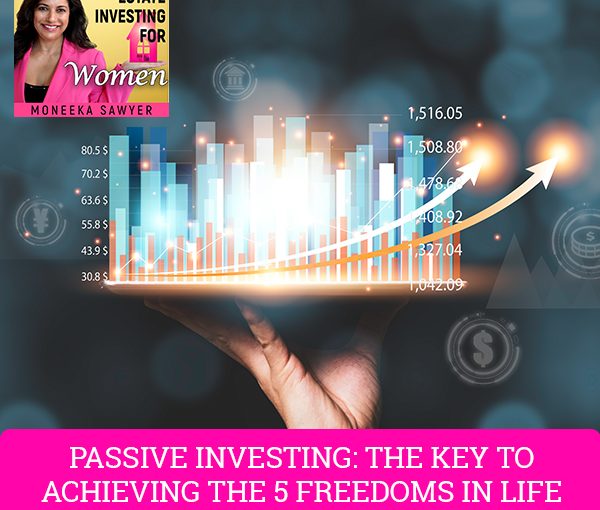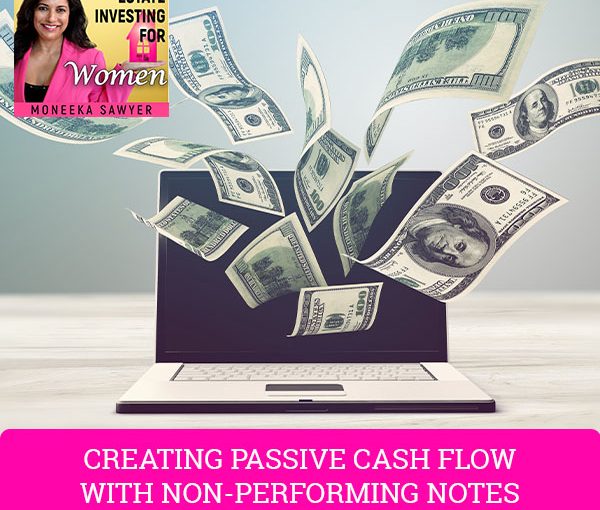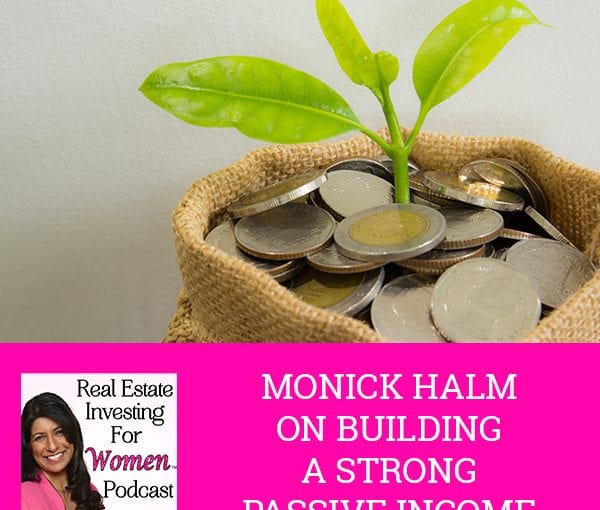Setting Up Your 2025 for Success!
Moneeka Sawyer is often described as one of the most blissful people you will ever meet. She has been investing in Real Estate for over 20 years, so has been through all the different cycles of the market. Still, she has turned $10,000 into over $5,000,000, working only 5-10 hours per MONTH with very little stress.
While building her multi-million dollar business, she has traveled to over 55 countries, dances every single day, supports causes that are important to her, and spends lots of time with her husband of over 20 years.
She is the international best-selling author of the multiple award-winning books “Choose Bliss: The Power and Practice of Joy and Contentment” and “Real Estate Investing for Women: Expert Conversations to Increase Wealth and Happiness the Blissful Way.”
Moneeka has been featured on stages including Carnegie Hall and Nasdaq, radio, podcasts such as Achieve Your Goals with Hal Elrod, and TV stations including ABC, CBS, FOX, and the CW, impacting over 150 million people.
Build & Protect Your Wealth Through Apartment Investing With Ronnie Shalev
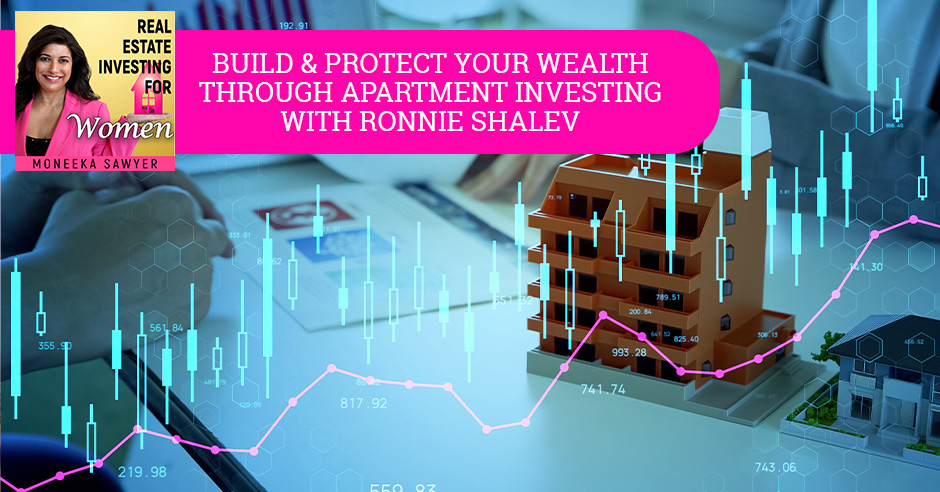
Being a doctor can be exhausting, especially when you have to work 12 hours and your family relies on you financially doesn’t help in helping to reclaim your life. This episode is dedicated to everyone who wants to reclaim their life and remain financially stable. Today, Ronnie Shalev, a board-certified ER physician turned real estate investor, shares her career shift and how you can build and protect your wealth through apartment investing. Ronnie’s mission to help people with their financial wellness led her to provide some more insights on why investing in apartments is more relevant than other asset classes. Choosing the right market is part of risk mitigation, which Moneeka and Ronnie dive deep into. So if you want to free yourself from the job holding you down, tune in to this episode now! Learn how you can live a life on your terms!
—
Watch the episode here
Listen to the podcast here
Build & Protect Your Wealth Through Apartment Investing With Ronnie Shalev
Real Estate Investing For Women
I am so excited to welcome to the show, Dr. Ronnie Shalev. She is a board-certified emergency physician turned real estate investor. She was a practicing ER doc for sixteen years, but her job sucked the life out of her, leaving her drained, burnt out, and unable to enjoy her family and kids. She wanted to reclaim her life but didn’t know where to start.
She was making great money. Her family was relying on her financially, so she was trapped by the golden handcuffs. That’s when she started exploring the world of real estate investing and found a way to make recurring income without having to be physically at the hospital or with her patients. After some time, the income she earned from her real estate investments gave her the freedom to quit her grueling emergency medicine job and transition to a medical device company. Ronnie’s mission is to share her knowledge with other women who are feeling trapped and want to free themselves from their jobs and live life on their terms. Welcome to the show, Ronnie. It’s so nice to have you here.
Thank you so much for having me.
I know we were talking a little bit about this in the green room, but it’s interesting to me how many doctors have come onto the show talking about either how they are evaluating syndications, or they are actual syndicators. What’s fascinating to me is my mom is also an MD. I know what kind of income you guys make. Especially as an ER doc, that’s some crazy difficult stuff, and they pay you well for that.
It’s fascinating to me to see how syndications and being a syndicator can replace that kind of income. It’s such an inspiration. This is something to think about. We wonder, “Can I replace my income?” Think about the six-figure incomes that are being replaced with real estate. It’s awesome. Thank you so much for coming to share your story on the show.
I’m so excited to share my story. I know that a lot of people can relate to wanting to design their own life.
I’m one of those people, too. That’s what bliss means to me. It is a choice. It is not being a slave to the expectations of the world around us, whether it’s our job, our families, or whatever it is. We want to be able to live life on our own terms. It’s awesome. I read your bio, but why syndication? Why did you take this particular route?
I was not ever planning on being a syndicator. Ever since I was a little girl, I have wanted to be an ER doctor. I wanted to help people. I wanted to help people with their health and their life in their times of need. I remember a shift where I was alone. I was the only doctor in the entire ER. There was no scribe, no mid-level, no physician assistant, nothing. It was around 10:00 PM, and I was treating two stroke patients at the same time. I also had an asthmatic who was having severe trouble breathing. I had someone having a heart attack. The waiting room was full. There wasn’t an empty chair. You could see the pain and frustration on everyone’s faces, the patients and the families.
On top of it, there were several ambulances lined up waiting to get checked in. I looked at the clock to see, “When is my relief coming?” It was eight more hours. The stress was unbearable. I couldn’t breathe. I was responsible for all of these people. The administrators had cut all of the physician hours and assistance hours, leaving only one doctor responsible for everyone who walked into the ER or was already there. I’m faced with this situation. What did I do? I put my head down, and I did it. I took care of everyone at the expense of my own health. I didn’t eat, drink, or pee during that shift.
For eight hours?
Twelve. I came home, and I was so exhausted. I collapsed on the bed. I went to sleep in my scrubs, which is unheard of because you feel disgusting after the hospital. I slept the rest of the day. My husband and my family didn’t understand why I was so tired. They didn’t understand that I’d taken care of over 50 patients that night with extreme stress and liability. It’s hard to fathom. How could they?
I started to think about what else I was supposed to do. I was like, “What else is there? I’m a high-paid hourly worker, and I’m tied to my job. I have to keep it.” I was told by my administrators with no medical education how to practice medicine and how quickly to see the patients. They made sure to tell me that I was dispensable and could be fired if they didn’t like my numbers. I started to think, “Why did I love this job in the first place? Something has to change.” That’s when I started looking at other options and what else was there. I was like, “How can I free myself from this job?” That’s where I found real estate.
It was about that time that a friend told me that he was passively investing in real estate. I didn’t understand what that meant. He was like, “I own a piece of 100 7-Elevens, and I receive a check every quarter. I get passive income.” I’m like, “Passive income? What is that? That’s weird.” For years, I had been working per hour. My time was not passive at all. My money was never passive. I thought to myself, “This sounds weird. This sounds fishy. Is it a pyramid scheme? Is he lying to me? It sounds like it’s too good to be true. Maybe you could lose your money. I don’t know.” I was very paranoid.
I started thinking and remembering what was going on in the hospital and with those administrators. I was so frustrated about trading my health and my well-being for money. I decided, “Why not? Let’s give it a shot. It’s not like real estate goes to zero. It’s almost impossible for that. There are hard assets. There’s land.”
My husband and I decided to dip our toe in and do a small investment first. It worked. We started getting checks every quarter. I said, “This is interesting. Does it work again? Let’s do it again.” We did it again. We started seeing results. That’s where we started investing. We’ve been part of over 26 deals. We’re always looking for new ones. We did a reassessment and said, “I could leave medicine. I can go to something that’s way less stressful with this passive income that we’ve generated.” It took many years.
How many?
It took eight years. That’s the thing. This is not a get-rich-quick scheme or something like that. This is a long-term strategy where you know what the outcome is. It’s predictable. After I was able to do that, I still see all of my physician friends and colleagues as miserable. I’m telling them, “This is what I did.” They’re like, “How did you do it? Did you win the lottery?” I’m like, “I didn’t win the lottery. This is the actual strategy that I did.”
Apartment investing is a long-term strategy where you know what the outcome is. Share on XThey still have fear. They were like, “I don’t have time to learn it. I don’t have time to study it.” I said, “That’s perfect. I’ll do it for you. I’ll do that. You can leverage my expertise. You can leverage my time. You can leverage other people’s money through the banks.” I went and studied how to do it actively myself. My husband and I took a mentorship program and learned how to do it. We started our own company, where we are syndicating apartments specifically and bringing along other professionals.
Do you ever miss the helping people aspect of medicine?
I help people all the time. What I didn’t know when I was looking at being a physician as a career at that time, I thought, “This is how you help people.” Now I have a better perspective that you don’t have to help people with their health. You can help them with their financial wellness. I’m still helping, which is huge. On top of it, I’m also able to still use my medical knowledge. I work at a medical device company. It’s not because I have to work there. It’s because I want to work there. We’re helping thousands of patients every single day. I get to use my medical knowledge. I get to use my investing knowledge. I get to help so many people on a grander scale. I’m still feeling that drive to help people. That’s that feeling.
You don't have to help people with your health. You can help them with their financial wellness. Share on XIt’s so interesting because I don’t have to work either. I’m like you in your situation. I’m, by nature, a coach. My mom was a psychiatrist. She and I are so similar. My heart is to help. I found a very similar thing when I was coaching. I was trading time for money. I gave up on so many other things that were important to me. It’s certainly not comparable to you, but there’s that feeling inside me of wanting to help.
As I’m trying to redesign my life, retire, and have more time for my husband, my family, my nephew, and my parents as they’re aging, I’ve got the financial wherewithal to not have to do anything. My way of helping is by doing this show because this way, my ladies are elevated by my guests and whatever little knowledge I can offer. It’s an opportunity for me to give back so that I have that peace inside of me fulfilled. The biggest things in people’s lives that we need an abundance of are our health, our wealth, and love. It is our relationships. It is the three biggest things, and you’re handling two of them. That’s unbelievable. That’s awesome.
I love that you’re helping so many women and bringing on powerful people to motivate. How does someone know that they can do it without hearing that other people have done it, too?
That’s right. Thank you for sharing your knowledge with my ladies. Talk to me a little bit about why you chose apartments.
We passively invested in a lot of different asset classes. We’ve done self-storage, retail centers, mixed-use buildings, industrial warehouses, and assisted living. There’s a lot that I’ve done, but I like apartments the best because they make sense to me. I feel like housing is a basic need. Everyone needs a place to live. If they’re shopping online on Amazon, they’re at home. They’re not going into the office. They’re working remotely. They’re doing it from their homes.
With the interest rates going up and the supply shortage, people can’t afford a house. They can’t afford a down payment. There’s a whole population of renters that have to be renters. There’s also a whole population of people that want to be renters. There are the Millennials that don’t want to be tied down. They don’t want to be having these roof leaks, plumbing, and all kinds of deferred maintenance on their home. They don’t want that. There are seniors. These are people that are trying to buckle down and live on fixed incomes. They don’t want surprise expenses with their homes.
That’s a good point.
They’re downsizing. They move out, so they become renters. There are all these people going to rent, and there are not enough places. That’s why rents are going up crazy all over the place. I’m going into apartments, but I’m not just going into any apartment. We focus on recession-resistant assets. We’re looking at Class B and Class C properties. The reason I’m looking at that is that what happens when you’re in a recession? It is what people might say we’re in. You’re living in a Class A building, which is a high-rise. There’s a bellman or a doorman. It has all of it.
Maybe you have a pay cut, or you get furloughed, or you’re let go. Why do they move? They move into Class B. It is the same thing. The people living in Class B move to Class C. I’m right in that demographic that whether we’re in an economic downturn or not, people are looking to live there. I’m taking those communities, and I’m making them better. I’m doing value add. We’re putting in dog parks and solar panels. We’re including internet in our packages. We’re doing a lot of nice things for the residents, making it a community where it’s a nice place to live. What we’re doing is we’re adding value. We’re making the residents a great place to live, and then the investors make money. It’s a win-win.
Tell me about how you pick your markets. I know you’re doing Class B and C, but how do you pick the markets you want to go into?
I’m focusing on the Sunbelt states because I want people to be moving to where my apartments are. I’m looking for landlord-friendly states. I want to be able to evict if I need to. I don’t want a tenant that has lived there for two years and doesn’t pay rent. I’m looking for landlord-friendly states. I’m looking for growing markets. These are sub-markets where people are moving into. Why are they moving? There are jobs. I’m looking for where there’s job growth.
I don’t look for only one employer or one type of employer. The last thing you want is to have this robust factory, and then the factory closes, and everybody loses their job and moves out of your apartment. I’m looking for markets where there are multiple diverse employers in energy, entertainment, device, biotech, or whatever it is. There’s a lot of variety. If one goes out of business, they’re not all going to go out of business.
You can’t completely reduce risk, but you can start thinking and pre-planning if you have a safety plan. I’m looking for recession-resistant assets. I’m looking for places where you can evict tenants that aren’t paying. The goal is to bring income. We want to make sure that people are moving there. We want to make sure that there are different types of employers. There’s a lot of thought into the market selection.

Apartment Investing: You can’t completely reduce risk, but you can start thinking and pre-planning.
In EXTRA, we’re going to be talking about how to mitigate risk. My belief, and correct me if I’m wrong, is part of the mitigation of risk is how you choose a market. Is that true?
Absolutely.
We’ll do a deeper dive on that, so we get a little bit more conversation around that in EXTRA. I’m super excited about that. You talked about passive investors versus active investors. Give me your perspective on it because, as a doctor, it’s going to look very different than it does for the rest of us. Go ahead and define for me what you were looking for as far as a passive investor versus an active investor.
Personally, I love passive investing. It is the ultimate way to explode your wealth. The biggest reason because of that is because of leverage. You are leveraging other people’s expertise. I’m not going as a passive investor to go and fly into every city, drive around, see what the best areas are, and then do research on which companies are moving there, who’s moving their headquarters, and what’s happening in the city design planning. Someone’s doing that for you. You’re not spending your time doing it.
You’re also leveraging other people’s relationships. You’re not having to forge relationships with brokers and tour properties and show them that you’re serious. You’re also not having to sign on for any loans. When you’re a passive investor, you’re not having to find the financing, the debt, and all that stuff and meet all these bankers and mortgage brokers. You don’t have to do all of that. You also don’t have to be finding the deals and analyzing them. You’re leveraging other people’s expertise. You’re leveraging other people’s time.
You have a life. You’re a busy professional. You have a family. You want extra income, but you don’t want to be tied to a new hobby where you’re like, “I wasn’t planning on being a landlord,” where tenants are calling you about termites and how there’s a leak or a fire. Passive investors don’t have to deal with any of that.
Active investors, on the other hand, are the people that want to do work. They’re the ones that are finding the properties. They’re the ones that are doing the market analysis. They’re like, “Is this a good market? Is this a good property? Does this make financial sense? What is the business plan? Is this a buy-and-hold? Are we holding it for a long period of time and waiting for it to go up, or are we renovating it? Are we raising rents? What are we doing?” You’re the one that creates the plan. You’re in charge of it. You’re also in charge of executing that plan. It is making sure that the contractors are coming, that the property managers are renting out the units, and that there’s marketing to the property.
You’re doing a lot of that stuff, and then at the end, you’re the one that does the exit plan. You either refinance it or sell it. Active people are doing active work. It depends on what you want as a person. How do you want to design your life? That’s what I love about real estate. Anything you do in real estate, you’re going to do well. Is it active? Is it passive? Is it commercial? Is it residential? There are so many things that you can do, and you’re going to do them well. As long as you have the right team and the right education about it, anyone can do it.

Apartment Investing: Anything you do in real estate, you’re going to do well.
It’s available to anybody. That’s what I love about real estate. That’s not true in other parts of the world, but here in the United States, we are so lucky. The government even helps you do it and rewards you for doing it. They want people to own their houses. They want people to feel committed to their communities. They want that, so they encourage us to do that.
It’s interesting because when we look at passive versus active, there’s a whole spectrum of passive versus active. The ultimate passive is investing, for instance, in REITs or syndications. I’d love for you to address that. It is all the way to fully actively being the syndicator doing all of those other things. Personally, I have an active model, but I only 5 five to 10 hours a month. It’s active, but I consider it passive. For me, that’s what I consider passive, but you’re right. It’s not fully passive.
I’m my own acquisition person. I have the exit strategy. I’m calling the tenants for rent raises. I’m doing all of those things. It doesn’t take me a lot of time, so it seems much more passive than a 40-hour-a-week job or a 60-hour-a-week job, which is what I had before. It’s still very passive. It’s more active than what you’re talking about. Could you tell me a little bit about your perspective on REITs versus syndication?
A REIT is very similar to a stock. You are buying shares of a company that is owning and managing properties. You’re not owning the real estate itself. A positive with a REIT is that your money’s not locked into a property. You can buy it. The stock, you can sell it. It’s like the stock market. You’re liquid. You can go in, and you can go out.
What I don’t like about REITs is that you don’t own the real estate. You’re investing in a company. If the company is spread thin or something happens in the company, those shares do go down. It’s not a for sure thing, not that anything is for sure. Real estate is getting the depreciation from the real estate. If you are owning part of a company, you’re not getting the depreciation. In syndication, you are an actual owner of the property. You get a depreciation. You get the tax benefits without having the headaches of home ownership.

Apartment Investing: In syndication, you are an actual owner of the property. You get depreciation, the tax benefits without the headaches of home ownership.
Thank you for that. That was awesome. I love what you’re sharing. I’m so inspired by your story and what you’ve been able to do. Could you tell us how people can get in touch with you?
I have an email account. If someone wants to email me, it’s [email protected]. You can email me. I’m happy to hop on a call and talk to you about what you want, how you want your life to look, how active you want to be, or how passive you want to be. Picture a day when you go to work because you want to go to work, not because you have to go to work. Picture a day when your spouse tells you, “You seem healthier. I love the freedom that we have now in our life.” Picture a day you can travel if you want to travel, relax if you want to relax, or serve others if you want to serve others. That’s what real estate investing can do for you. That’s what it did for me. That’s why I’m so passionate about real estate and helping other people. Email me. I’ll be happy to connect.
I love that. Tell us a little bit about your free gift.
I offer a free masterclass about passive real estate investing, what it is, what are the different asset classes you can invest in, and the difference between active and passive. It is a lot more in-depth than we’re talking about here. We’ll talk about what syndication is and what returns we are looking for. You can find it at Invest.ShalwinProperties.com.
That is perfect. Thank you for that. That will be a great way for people to get started and get to know passive investing a little bit more. Thank you. We are going to be doing EXTRA, which is going to be about how to mitigate risk. We’re going to be doing a little more of a deep dive also on finding markets. We’re going to do that after our three rapid-fire questions. Are you ready for three rapid-fire questions?
I’m ready.
Give us one strategy for getting started investing in real estate.
The best way to start is to find out the different ways that you can start and figure out how you want to start. Do you want to be doing it all? Do you want to start passive and then be active later? Do you want to start active and maybe be passive later? Do you want to do both? The first step is to sit down and think about what you want to do and then do it. That’s my big thing. Taking action is so important.
I agree with you on that. What is one strategy for being successful as a real estate investor?
It’s important to listen to podcasts. This is an easy thing. Try to educate yourself by hearing people talk about stories about how they did it. Once you hear how they did it so many times, you start thinking, “I can do it, too. It doesn’t sound so hard.” Listening to other people’s successes and how they did it is important in being successful yourself because success leaves clues.
Listening to other people's successes and how they did it is very important in being successful yourself because success leaves clues. Share on XIt’s a personal self-brainwashing, isn’t it? It is building that confidence. It all starts in mind.
I believe that strongly.
Tell us one daily practice you do that contributes to your personal success.
We’re going to do mindset. I work on my mindset every single day. Stress is wired into me, whether I’m in the ER or doing real estate. My mind is always thinking. In calming my mind down, one of the big things that I do is meditate. I also practice something called reframing, where if you’re thinking one thing, you release, pause, and start thinking like, “Is this thought serving me? Is this helping me to think this way? How am I going to get where I want to be?” It’s certainly not going to be thinking this way. You got to start thinking the other way. Trying to manipulate how I’m thinking and trying to always reframe is a big thing that has always helped me.
Reframing is such an interesting thing because people are like, “You’re making it up if you’re reframing.” The thing is that you made it up in the first place. Any situation that’s happening could be happening to ten different people, and they would have ten different reactions. The situation is not the problem. It’s a story that we make up about it that creates our response. If you’re going to make up the story anyways, you might as well make up a story that’s more serving to your business, your joy, and your life.
There’s something in our minds that we have something called automatic negative thoughts. That is back in the caveman days when we were trying to protect ourselves. We’re like, “Someone’s coming,” and it could be a tiger or whatever it is. That is a preservation thing. Our mind does that. We have to stop. We don’t have to listen to every single thing our mind tells us. That’s something that is important for people to understand. You need to recognize when you’re starting to spin in a spiral of negative thoughts that might not be true.
True is an interesting word. There are some basic truths like don’t kill people. That’s probably a basic truth. In general, in our lives, truth is very subjective. What you’re perceiving is not necessarily true. I love that. Thank you so much for all that you’ve offered in this portion of the show. This has been wonderful, Ronnie.
Thank you so much for having me. I love talking to you.
We get to talk more in EXTRA. Stay tuned. We’re going to be talking about mitigating risk in syndications and picking markets. I’m super excited about that conversation. If you are subscribed to EXTRA, stay tuned. If you’re not but would like to be, go to RealEstateInvestingForWomenEXTRA.com. For those of you that are leaving Ronnie and me, thank you so much for joining us for this portion of the show. You know how much I love having you here. I look forward to seeing you next episode. Until then, remember, goals without action are just dreams, so get out there, take action, and create the life your heart deeply desires. I’ll see you next episode.
Important Links
- Dr. Ronnie Shalev
- [email protected]
- Invest.ShalwinProperties.com
- RealEstateInvestingForWomenEXTRA.com
About Dr. Ronnie Shalev
 When I was an ER doctor, my high pressure job sucked the life out of me. I was left weary, burned out, and unable to enjoy my family, my kids, and my day-to-day life. Since I made great money, I felt hopelessly stuck in these “golden handcuffs”, and saw no end in sight.
When I was an ER doctor, my high pressure job sucked the life out of me. I was left weary, burned out, and unable to enjoy my family, my kids, and my day-to-day life. Since I made great money, I felt hopelessly stuck in these “golden handcuffs”, and saw no end in sight.
Now I help others create PASSIVE INCOME so that they have the FREEDOM to do what they want with their time and not be held captive by their jobs.
SHALWIN PROPERTIES partners with investors who want access to real estate deals so they can get the benefits of real estate without the headaches of being a landlord.
Whether you want to diversify your assets, earn passive income, hedge against inflation, or maximize the tax benefits that come with real estate investing, Shalwin Properties helps you every step of the way.
——————————————————
To listen to the EXTRA portion of this show go to RealEstateInvestingForWomenExtra.com
Learn how to create a consistent income stream by only working 5 hours a month the Blissful Investor Way.
Grab my FREE guide at http://www.BlissfulInvestor.com
Moneeka Sawyer is often described as one of the most blissful people you will ever meet. She has been investing in Real Estate for over 20 years, so has been through all the different cycles of the market. Still, she has turned $10,000 into over $5,000,000, working only 5-10 hours per MONTH with very little stress.
While building her multi-million dollar business, she has traveled to over 55 countries, dances every single day, supports causes that are important to her, and spends lots of time with her husband of over 20 years.
She is the international best-selling author of the multiple award-winning books “Choose Bliss: The Power and Practice of Joy and Contentment” and “Real Estate Investing for Women: Expert Conversations to Increase Wealth and Happiness the Blissful Way.”
Moneeka has been featured on stages including Carnegie Hall and Nasdaq, radio, podcasts such as Achieve Your Goals with Hal Elrod, and TV stations including ABC, CBS, FOX, and the CW, impacting over 150 million people.
Passive Investing: The Key To Achieving The 5 Freedoms In Life With Whitney Elkins-Hutten
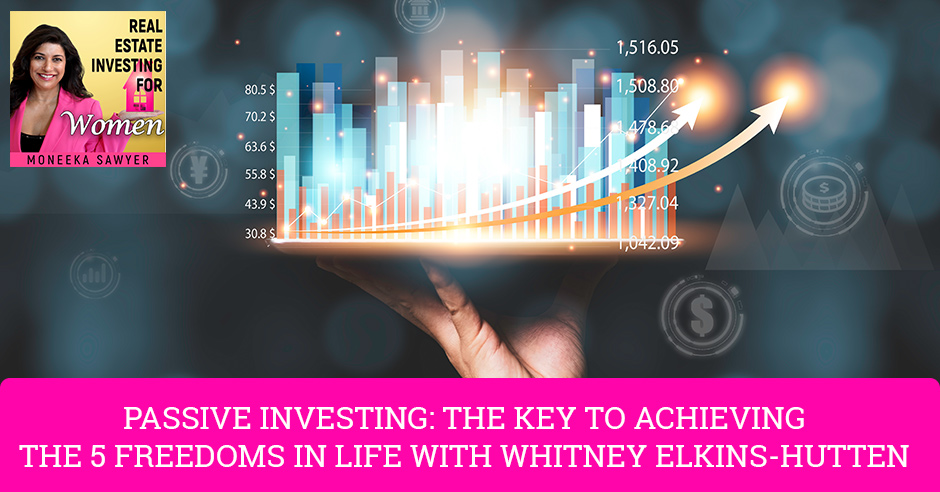
Passive investing is one way to the five freedoms in life: freedom of income, choice, independence, location, and impact. When you get into passive real estate investing, you need to be sure of what you want, why you need it, and what you need to do to get it. Once you know those answers, you will be free financially and personally. Join Moneeka Sawyer as she talks with the Director of Investor Education at PassiveInvesting.com, Whitney Elkins-Hutten. Listen in as they discuss how you can achieve true financial independence in real estate. Learn why financial freedom isn’t the only freedom you need in life. Find out how to time block your calendar to make the most out of your time. Plus, discover how to get into real estate syndications. Tune in for more!
—
Watch the episode here
Listen to the podcast here
Passive Investing: The Key To Achieving The 5 Freedoms In Life With Whitney Elkins-Hutten
Real Estate Investing For Women
I am so excited to welcome to the show, Whitney Elkins-Hutten. She is the Director of Investor Education at PassiveInvesting.com and a partner in $700 million in real estate, including over 6,300 plus residential units and more than 1,400 plus storage units across 8 states. She experienced flipping over $4 million in residential real estate. That’s an awful lot of real estate, Whitney. Welcome to the show.
Thank you.
Whitney is one of these patient beautiful people we’ve had to reschedule several times. I super appreciate that you are even here. Thank you so much for that.
My pleasure. I’ve had to reschedule myself.
Whitney, could you give us the high-end version of your story? Why are you in real estate? How did you start? Give us the short and dirty version.
I started in real estate investing in 2002 by accident. I started as an accidental landlord. I bought a house with a significant other. About a month later, the relationship fell apart and the house and everything were in my name. I was terrified. I was like, “What am I going to do?” I was young and didn’t have a family at the time so I stuffed the house full of roommates.
The house also needed a huge rehab. There were psychedelic flowers painted all over the walls from the 1960s that had never been taken down. Poor layout, you name it. A green sheet was covering beautiful hardwood floors. My roommates didn’t mind living in a construction zone. As a matter of fact, I paid them a lot for beer, pizza and sushi.
We turned that house around in about eleven months. When I sold it was probably my number one investing mistake because I didn’t realize the power of real estate at that particular time. I had read Rich Dad Poor Dad and got it all wrong so I had to go back to school. What I did realize when I sold that property is I made more in eleven months than I did in my day job working 60, 70 and 80 hours a week in public health and traveling all the time.
I hadn’t been paying for my housing at all because my roommates had supported the majority of the bills with rent. I was like, “How many more times can I do this?” That term is called live-in flipping. I did a few more projects by myself and then my husband eventually joined me. Not all projects went extremely well. Maybe some people here have heard of the story where the bus fell into the roof of one of my properties. Yes, that did happen. Most people are like, “How does the bus fall on the roof?” On a mountainside, it will happen there.
Fast forward to ten years, I found myself not able to leave my day job. I didn’t have any more financial independence than I had started with. I had buckets of equity but I couldn’t pay my day-to-day bills consistently with that type of income. It dawned on me. A friend of mine mentioned to me one day, “Why don’t you keep those properties and put a renter in them with that land?” I scaled to about 30 properties. About a year and a half, single-family properties in-state and out-of-state.
Another problem is that I was able to step away from my day job to be at home with my family and our young daughter but my husband couldn’t because we couldn’t pick up properties fast enough. We hit another ceiling of achievement and had to learn how to scale through the larger multifamily property. We did it both actively and passively.
I quickly learned that I’m more geared toward the passive side of investing. That brings me to where I’m at. I’m still a partner in all that real estate that you named. However, one of my favorite investment vehicles is how to get into passive real estate like multifamily, self-storage, car washes, hotels and even real estate debt.
That’s what’s been able to afford my husband and me to have the five freedoms in life, freedom of income, freedom of choice, freedom of location independence and freedom of impact. That’s what I get to do here every single day at PassiveInvesting.com. As the Director of Investor Education, I help people realize those same goals for themselves. It’s a journey I took.

Passive Investing: Passive investing is one way to the five freedoms in life: freedom of income, freedom of choice, freedom of independence, freedom of location, and freedom of impact.
It’s so interesting that you did read Rich Dad Poor Dad. That’s the book that seems to start a lot of people on investing. You’re still like, “I’ll get rid of this one.” I have to tell you that I made a similar mistake. I hadn’t read Rich Dad Poor Dad at the time because it wasn’t out. That’s how old I am. I sold my first piece of real estate too. Years later, I was like, “What was I thinking?” We bought it for $200,000. It is now worth $1.75 million. That’s the way things go.
It was the second book for me and Cashflow Quadrant. I know Robert Kiyosaki goes over the cashflow quadrant in Rich Dad Poor Dad. I wasn’t in the space to absorb what he was trying to say there. I knew I had landed on something with real estate. I still had this thought that I have to put in all the work. That’s the only way that I can be rewarded. I have to provide all the value.
That’s not necessarily the case. It was more about how can you shift your income from trading time for money into either building your business or learning how to invest in other people’s businesses. It was about ten years after that when I hit the first inflection point. When we decided to start holding onto some of these properties that we were flipping, I read that book. It was a slap in the head.
Tons of bricks came crashing down because how many flips had I done before then that we hadn’t held onto? I’m like, “That would’ve been amazing if I could have kept them all.” We were buying with a low down payment. We had low-interest rates. We were able to use 203(k) loans for construction because we were living on the property. We were using the 121 exclusion, which is the 1031 exchange for real estate investors to keep our capital gains tax-free. How powerful would that have been if I was able to keep all of those?
I love this conversation, Whitney, as we’re starting together because I would like this to land with people. Much of the time, people that are reading this show understand real estate and what leverage is to a degree. It is hard to switch from the mindset of trading time for money to having your money work for you passively.
You work on the front end but then you let it work for you after, in a way, like hiring an employee that you don’t have to manage. There are a lot of people that have W-2 jobs that have a hard time making that switch. It’s interesting that you mentioned that even as a flipper, you were in real estate and still had trouble making that mental switch.
I have a lot of properties where I have tenants in them. They’re mostly passive. We know that as a landlord, if you’re managing your property, it’s mostly passive, not completely passive. I make a lot of rent and appreciation on those properties by doing very little work. Relatively, the trading time for money is very low. My ROI is huge for the time that I spend.
I am trying to move to fully passive. It’s even hard for me to go there because once you’re used to being in a way of doing things, it’s hard to go to that next level. I wanted to say that so that the ladies that are reading can see that if you’re having trouble fathoming this and taking that next step, understand that all of us, from the people at the very beginning to the people that have reached great heights in real estate, do have trouble making paradigm shifts when we’re going to the next level. Sometimes we need to hear, “It’s okay. You’re not alone. We all do this,” but it is necessary to make that paradigm shift to get there.
You talk about paradigm shifts but for me, it was my identity. The initial shift of being able to step into real estate and allow it to work for me. Shifting my active income from my public health job into being a real estate professional. I spent how many years in school and training, studying for board exams and all of that. I know that if I want to have true financial independence, I have to let that side of me go. It’s not that I will never do public health ever again. It’s just that I’m not a public health professional, I’m an active real estate investor. I have a lot of controlled property that I own and I use property management.
If you really want to have true financial independence in real estate, you have to shift your identity solely to real estate. Share on XAs I started unwinding some of that portfolio and shifting it into truly passive investments, passive with your time and income, that was another identity shift. Those core 30 single-family properties, my babies, I had trouble letting those go because I was like, “I’m a single-family investor.” That’s what I do. I knew if I needed to go to the next level, that part of me, I needed to shift my identity yet again to be a real estate investor. You get to create more impact in the world too whenever you do that. For me, it’s those 30 single-family properties. At one point in time, we were up to 52 between Indianapolis and Kansas City.
If you think about it from how I was paying my real estate taxes, I’m only impacting 2 areas and 52 households. Now, I’m across eight states and multiple cities in those areas. The taxes that I pay in those areas and the thousands of families that we’re able to impact, it’s a greater impact that I’m able to create. It is like Marie Kondo. You got to give that old you a little hug and then step into the new you to realize that full potential.
It is interesting because we’re evolving beings and we have so much potential to evolve as human beings but then also financially in our impact on the world and those sorts of things. You’re right. Every single time we step into that new identity, it’s a complete transformation. What also can happen to a lot of people is this Imposter syndrome. “I don’t belong here. I got all those degrees. That’s where I belong. I’ve been doing this for 40 years. This is where I belong.”
The thing is that nobody defines where you belong except you. I have often said, even about Imposter syndrome, that if you’re not failing it, you’re not going big enough. You’re not pushing yourself to that next level. When you push yourself to that next level is where you start to feel that doubt but you’ll get there. You did it the first time too.
To become the identity that you are now, you pushed. You did this education and all these hard things to become that person. Ladies, I wanted you to know this. Maybe it’s time for that identity shift so that you can go to that next level. You have 5 different kinds of goals that you look at in life and 5 areas of financial freedom. Talk to me a little bit about your perspective on goals, not financial freedom but five kinds of freedoms.
These aren’t concepts that I’ve created. These are things as a student of history. My dad was a History major and I rebelled against every museum he ever took me to. It wasn’t until he took me to Custer’s Last Stand in Montana that I was like, “I need to get this. I need to start studying the past.” Studying these great people so we can learn.
The reason is not that we will never make mistakes ever again, but so we can collapse time and get through those obstacles and mistakes faster. I know that was a little bit of a tangent but stick with me here. When I started hating those first levels of achievement, even with that first house, I’m like, “The first house went swimmingly. In the second house, I did everything wrong. What was happening?”
I essentially repeated the same thing but here I barely broke. My neighbor tenant who was living in a bus fell into the roof of the property the day after it sold. He’s pulling a shotgun on the police. I’m like, “What? I went off the rails somewhere.” It was because I hadn’t taken to heart the lessons that I could have been learning. I don’t have to learn them all myself. I can learn from other people.
Long story short, it was like, “Success leaves clues.” That’s one of the quotes that I love by Tony Robbins. Who can I learn from and start piling all these different pieces together? When I heard about the five freedoms in life, I was like, “That’s it.” When people said I’m pursuing financial freedom or financial independence, I’m like, “That’s one but there’s something else there for me to pursue.”
It can’t all be about money. I landed on choice in time but there’s still something else there for me to pursue. When I heard about the freedom of location and independence but more importantly, the freedom to create an impact, I was like, “That’s it. That is what I’m after.” Every time that you talk with an investor or a client and you start to uncover what they’re trying to achieve in life, it’s going to boil down to one or multiple of those freedoms.
That’s step one. What do you want? Which of these freedoms are you truly going to go after? Step two isn’t about re-engineering the math behind how to hit that freedom. This is where a lot of people sell themselves short. They’re like, “If I want to have financial freedom, time freedom and be a location independent, I need 20 houses to go hit $10,000 a month.”
That’s not the question you should be asking yourself. You need to understand how you want to feel when you hit whatever X goal is, financial independence or freedom of choice. You’ll always move the goalpost on the number of houses and the amount of income that you want to create. That’s how people go through life unfulfilled if they continue to move the goalpost. We all do it.

Passive Investing: You need to understand how you want to feel when you hit your “X” goal. Because people will always move the goalpost on the amount of income they want to create and that is how they become unfulfilled.
Whenever they can define how they want to feel, that’s when they understand what enough and fulfillment is. You can always do more. There’s always room to do more but you have to understand for yourself, “How do you want to feel whenever you do attain your goal?” Understanding, “What do you want? Why do you want it?”
We can start re-engineering, “What kind of mindsets and skills do you need to acquire? Whom do you need to have in your world? Does it have to be you that does things or can you hire it out and shorten your path even further?” Those are the three centering questions that I challenge anybody when they’re working through their goals.
As we decide on a goal or land on a goal, for this conversation, we need to decide on strategies that are going to help us to get there. How do you recommend people do that?
That would be in that third question. Who do I need to become to achieve the goal? Do I need to let go of an identity? Do I need to shift my mindset? What do I need to embody to be a real estate investor that’s bringing in $10,000 a month? I have to probably break those initial identities around being an employee who’s told what to do.
I’ve got to switch to an entrepreneurial mindset. Thinking through what are those mindset changes that somebody needs to make. This process can take a couple of hours in the afternoon to think through. Once I’ve made these mindset changes, I’m going to pretend that I am this entrepreneur that’s bringing in $10,000 a month. What kind of skills does that person need to have? They probably need to have some financial skills, goal-setting skills, team-building skills, relationship-building skills and negotiation skills.
In some way, processes around tracking progress and continually checking in with themselves. Not once a year, not every six months, not quarterly. Weekly or daily. Whom do you need to have in your world to make this happen? When we’re first starting, we’re probably the ones that are wearing all these hats as the operator of our business. I encourage people to think future state in 1 year or 5 years. Elevate yourself to CEO quickly, which means you shouldn’t be the one posting on social media or sending out networking emails. You might have to do that at the very beginning but quickly let go of that and start bringing people into your role to help you out with these things.
Think about how you’re using your time. I take people through a wonderful exercise on time management. It’s helping them color code their time and putting dollar amounts to the activities they’re doing in their day. The shift in thought can be overnight and very impactful when you realize that you’re doing a lot of things that are robbing you of money, as opposed to giving you wealth, not only financial wealth but personal wealth, health wealth and stuff like that.
You could be doing things that are actually robbing you of money as opposed to giving you financial and personal wealth. Share on XI’m super curious about the color coding your time blocking to see where you’re losing your time.
I would encourage the people who are reading to go and look at your calendar. Write everything down. Maybe you’re doing this retrospectively. It’s like doing a food diary. Nobody wants to write down, “I had a Snickers bar or I drank a Coca-Cola,” especially if they’re trying to lose weight. Do that. Write everything down.
How much time do you spend on social media, watching TV or doing all these things that you may not need to do to be successful? Once you have it all written down, this is about getting real with yourself. You’re going to go through anything that you’re getting paid $0 an hour to do and color code it brown. This might be mowing the lawn, washing dishes or doing laundry. I’m not going to beat up TV, social media or anything like that.
The next thing to do is to go through and do any of those administrative tasks that you have to get done. They are related to your business but there’s no exchange for money. Maybe it keeps the lights on. You would pay somebody $10, $15 or $20 an hour to do. Color code those in light green. There are going to be those activities whenever you step it up. They’re going to be networking events or meetings that only you can do but if you train the right person to do it, they can do it. Maybe those type of activities yields you $100 to $1,000 an hour. Color code those in the brightest green you possibly can.
You’re going to go through any of those activities that only you can do that you love doing and you’ll do $2,000 or more an hour. Color code those gold. If your goal is to spend more time with family or your health, those things are priceless as well. Color code those things gold. The first time somebody does this, they’re going to realize that their calendar looks like a pile of poop. It’s a lot of browns. We’ve given the context of where you’re spending your time.
What do we do? We try to reduce, eliminate or outsource as much as we can the brown things. Cut what you can. Get it all gone. It’s hard like going on a diet. Those things tend to creep back in. Automate whatever you can and then outsource. Do you have to be the one to mow the lawn? Do you have to be the one to do the laundry? We’re outsourcing to our daughter some of these things so she can provide value to our household. I love gardening. I know I don’t need to be shutting down the garden for the winter. I have somebody coming tomorrow who’s spending all day gardening. I get to tinker around with my little herbs.
The light green things are going to be the first virtual assistant that you’re going to hire. They’re going to take on all of those low-level tasks for not that much. Maybe you pay them $10 or $15 an hour. They’re going to get it done so much faster than you can because that is their primary job. As you start scaling your real estate business, you’re going to start bringing in more people or partners to help share the load on those bright green tasks.
What that does is it’s going to open up more time for you to bring in those yellow tasks, those conferences that you should be going to network, the deal-finding activities that you need to be doing to scale your portfolio, spending time on your health, your family and relationships with others. We’re starting to open up time. When people say, “I don’t have time,” it’s a clue that tells me that they haven’t done this inventory to understand how they’re spending their time.

Passive Investing: When people say that they don’t have time, that’s a clue that they haven’t time blocked their calendar. They really don’t understand how they are spending their time.
On the other side of that, when you free up a lot of your time and you say, “I don’t have time,” it’s more about examining, “Is that because this is something you don’t want to be doing?” You can take it on both sides of that. In the front end, you clear up a lot of that time if you’re still feeling like, “I don’t have time.” You do have time now for the things that are important to you. Are those other things not important to you?
Also, if they’re not in alignment with the goal. I sit down with my family once a quarter and do what we call a dream session. What are the things that we want to learn and experience and how do we want to give back? Those are the three key areas for happiness. There are so many things that I want to learn like language and playing chess.
I have 50 things written in those categories but I don’t have time to do it all. You continue still to have to make choices. The things that you still can’t make time to get, does it align with your goals? How bad do you want it? We’re centered back on those three questions. “What do you want? Why do you want it?” Sometimes you have to purge. Every year, I purge a lot of the activities that I thought would be cool to do. I’m like, “They’re not. I don’t want this.”
Thank you for that. That was super awesome. I’m going to try that. I love the visuals of the colors. Talk to me about real estate syndications, syndicators, operators, markets and all of that stuff.
I have a whole process. I have boot camps. People can reach out to me. It’s this little ten-minute primer. It’ll work for them because it is truly a process. The first thing to understand is syndication means group investing. A lot of people initially are like, “I don’t understand what syndication is. It sounds like the mafia.” It’s not. Syndicate comes from the Latin word “As a group.” As a group, how can we take down a larger asset?
Syndication means group investing, it's not anything mafia-related. Share on XWe split that group further down into limited partners and general partners. General partners are the ones that are going to be the day-to-day operators who run the business. They’re going to be sourcing the deal, underwriting the deal, acquiring the deal, raising capital and figuring out credit and lending. They’ve got all the brokers and lenders. They can get other investor capital pulled together. That’s their core business.
The limited partner’s job is to do three things. Vet the operator, market and deal. That’s it. Once they write that check, essentially, they still have other jobs because they’re in a partnership. They still need to read the communication, ask questions and be responsive to any needs that the general partner has of them. Largely, their day-to-day operation role is non-existent. They’re done.
This is a great way for somebody who’s a high net-worth individual and somebody ready to transition from having their controlled portfolio. They’re ready to fire Home Depot and their property manager and get their time back. This is a great avenue. It can even be a compliment to somebody’s portfolio. Maybe somebody loves doing this specific niche part of controlled real estate.
They want to have exposure to multifamily, self-storage, car washes and hotels but they can’t. They shouldn’t and they can’t go learn it all and be the expert in everything. They can invest with experts. That’s what syndication is. The first question in this process is, “Do you love real estate?” If you can’t check that box, this isn’t for you. “Do you believe in real estate?” That’s a better question. A lot of people here do believe in real estate already. We can check that box.
The next question is, “What are your goals?” Do you need cashflow, tax benefits, equity or diversification? I have a whole eBook that walks people through this exact process. You need to understand your risk. Do you want a class-A asset? No CapEx, no maintenance. Do you want more value to add or plus assets where there’s maybe a little bit of CapEx and deferred maintenance to work on but you get maybe a deeper discount on the property?
Are you swinging for the fences and you want a development deal or a heavy-value add opportunistic deal? There are different reward profiles and risk profiles for all of these different types of assets. You have to understand what fits best for you and your portfolio. That’s all the groundwork. You have to do that groundwork first and it doesn’t have to take long. I walk people through a process that takes them an hour to get all these questions figured out for themselves.
It is then the time to go look for operators. We’re looking for high-quality operators. One of my favorite ways to find operators is by going to conferences or meetups. You can do a simple Google search if you would like but you got to get good at discerning great marketing versus a great operator. Always get on the phone with the operator before you ever write a check. One of the number one investing mistakes I see limited partners do is that they love the operator. They’ve heard about them through a friend but they don’t get on the phone with them themselves to fully understand if this is the right person for them to be in partnership with.

Passive Investing: When looking for an operator, always get on the phone with them before you ever write a check. You have to know if they are the right person for you to be in partnership with.
We’re trying to figure out, “Are they genuine, authentic and transparent? Do they have a background in real estate? What is their track record? What exits have they currently produced for their limited partners? What are their biggest challenges have been?” We went through the COVID pandemic. We’re butted right up against heavy inflation and a recession. We’ve had all sorts of weather-related issues in the past couple of years.
There has to be some challenge that’s cropped up. I’m not looking for an operator that has had zero challenges. I’m probably more attuned to invest with an operator that has had challenges and overcame up well versus somebody who’s never had a challenge. What you’re doing when you go into passive investing goes back to that identity shift.
You’re no longer the day-to-day operator on a deal. You’re investing. According to Robert Kiyosaki’s Cashflow Quadrant, you’re getting into that self-employment category and shifting into that investor category where true financial freedom and time freedom are found. You have to get good at vetting operators. The other mistake I see limited partners make is that they get starry-eyed by returns on deals. I can put any number down on these papers guys.
I can show it to you but the operator is the one that has to deliver so you’re investing in people primarily with this type of strategy. Whereas before, you were the strategy and the person. Essentially, this was leveling up, becoming the CEO and back-filling with a Director of Operations or a CO to help build and scale your investment business. There’s a wealth of questions that you can ask an operator here. That gives you a high-level little primer on that but then you want to understand what markets they’re in. I encourage people when they’re moving into passive investments to be in markets where a lot of investing cards are stacked in their favor.
When you're getting into passive investments, make sure you are in markets where a lot of investing cards are stacked in your favor. Share on XI like metropolitan service areas, maybe in the primary area or the secondary area or 35 to 40 miles from the city center. There’s a lot of infrastructures there. There is going to be a lot of money put into these areas. Certain areas are scaling there. They’re becoming a tertiary market and they’re scaling to a secondary market. You can find those areas to be on the path of progress but we’re looking for areas where the population, income growing and jobs are growing and diversified. Crimes and poverty is coming down.
We’re also looking for areas that have good landlord-tenant laws, especially if you’re going into multifamily. Certainly, good tax laws because taxes are one of your number one expenses on any real estate asset. If we can be in those pro-business areas, that’s even probably a feather in a cap for an investment. There are tons of other questions there and resources that I can share with people on how to suss out good markets and then we get down to the deal. A lot of people are like, “Show me the returns and the money.” That’s not where we should start.

Passive Investing: When you get down to the deal, don’t just ask for the returns and the money. You need to first double-check the deal if it matches your goals.
We need to double-check that deal. Does it match our goals? Where do we want to be invested? How do we want to be invested? Equity, tax benefits, diversification, is it in the markets that we want to be in? We can start getting into the business fundamentals of the deal. Does it have the risk profile that we want to have or be exposed to? Does it have the time horizon that we want to be exposed to? Does it have a distribution schedule that works best for our finances monthly, quarterly or annually?
We can start getting into the return profiles on the asset. There’s a wealth of other things that people need to do to complete actual true due diligence when they look at a deal. Those are some high-level screening-type questions to help somebody get jumpstarted into passive investing. When they look at an initial deal, to understand in a few minutes whether that deal will work for them.
Is all of that covered in the book that you’re going to be giving my ladies?
Yes, and more.
Why don’t you tell us a little bit more about that book? Ladies, Whitney has been super generous. She’s giving you a digital copy of her book.
It’s called The Passive Investor Playbook. It’s the ultimate guide for hands-off investing. It’s a free eBook. You can go to PassiveInvestingWithWhitney.com. It’s a subpage on the PassiveInvesting.com website. Be sure to go to PassiveInvestingWithWhitney.com because that’s the only place where you can get this eBook. Once you read it, I also put together a short checklist for people, that way they can have that short checklist and do a quick screening on a deal in the future once they learn these general principles. There is an opportunity to schedule time with me and we can talk about all things real estate. I love it.
I love that. Thank you so much for your generosity in sharing that. This has been good. We went a little bit off-topic of what we were originally planning on talking about but I feel, Whitney, you’ve offered such valuable information to my ladies. I super appreciate that.
It’s my pleasure.
Ladies, one of the things I asked Whitney to talk to us about in EXTRA is car wash deals. This is something that nobody has talked about on this show and I’m super intrigued about it. We’re going to talk about investing in car washes and what that looks like. Stay tuned for EXTRA to know more about that. Before we go into EXTRA, let’s do our three rapid-fire questions. Tell us one super tip on getting started investing in real estate.
The super tip is going back to understanding the three questions. “What do you want? Why do you want it? Whom do you need to become to get it?” When you answer that third question, it’s mindset, skills and networks. That’s what you’re digging into. It’s not a one-and-done deal. Continue to ask those questions. If you’re just getting into real estate, do it once a quarter. Once you get solid in your plan, do it every six months. Eventually, you do that as an annual ritual.
Before you get started in real estate investing, you need to know what you want, why you want it, and who you need to become to get it. Share on X1) It’s going to take you time to land on what you truly want. 2) Your wants are going to change as you move those goalposts down. Those are the three centering questions. My family does that still once a quarter to double-check that we’re flying the right path. If you’re flying from LA to New York, the majority of the planes are always off-course. If you can continue to do small course corrections, you’re going to eventually get to your destination.
What is one strategy to be successful as a real estate investor?
Understanding very quickly that it’s a who, not how game. That can be from delegating, offloading, automating and also relationship-building. You don’t need to do this in a vacuum alone. With many of the people that I work with, that is a hard challenge. We’re brought up as employees to do your work. Even in school, do your work, stay at your desk and don’t look at the other person. That’s not how real estate goes. The quicker that you can understand that it’s a community, it’s a team and the majority of the people are working together to get deals done, you’re going to scale fast.
Thank you for saying it exactly that way. I love that. What is one thing that you do daily that you would say contributes to your success?
For me, it’s putting my oxygen mask on first. I get out of bed. I have a kid, a dog and a husband. The first couple hours of my day are all focused on me and getting my top priorities done. My priority is my health and my relationships. Also, what is the first goal that I need to do and tackle getting those things done? I sound like the Army commercial like, “We get more done by 10:00 AM than most people do in a day.” That’s pretty much what I do but it’s putting my oxygen mask on first, eating, getting those things done and moving those chess pieces early on in the day.
By 10:00 AM, if my day gets derailed, I’ve already won it. My day on Monday got derailed when we had to take my daughter into the emergency room. She’s fine. I had already been up for a couple of hours and I was like, “Here we go. We’re doing this.” It didn’t set me that far back because I had already moved a lot of those chess pieces pretty early in the day.
That is great advice. Thank you for everything you’ve offered on this show, Whitney.
It’s my pleasure.
We’ve got more. We’re going to be talking about car washes. I’m so excited. If you are subscribed to EXTRA, please stay tuned. If you’re not but would like to, go to RealEstateInvestingForWomenEXTRA.com and you can subscribe there. For those of you that are leaving Whitney and me, thank you so much for joining us for this portion of the show. I super appreciate you and I look forward to seeing you next time. Until then. Remember, goals without action are just dreams. Get out there, take action and create the life your heart deeply desires. I’ll see you soon. Bye.
Important Links
- PassiveInvesting.com
- Rich Dad Poor Dad
- Cashflow Quadrant
- PassiveInvestingWithWhitney.com
- RealEstateInvestingForWomenEXTRA.com
About Whitney Elkins-Hutten
 The beginning of my real estate career went better than most—my first ever rental in 2002 was a huge success. It was on my second deal that I almost lost it all.
The beginning of my real estate career went better than most—my first ever rental in 2002 was a huge success. It was on my second deal that I almost lost it all.
Those two experiences shaped my real estate journey into what it is today. Knowing there had to be a right way and that success always leaves clues, I studied the greatest real estate juggernauts and was able to replicate the personal finance and wealth creation strategies that they used to create financial freedom.
——————————————————
To listen to the EXTRA portion of this show go to RealEstateInvestingForWomenExtra.com
Learn how to create a consistent income stream by only working 5 hours a month the Blissful Investor Way.
Grab my FREE guide at http://www.BlissfulInvestor.com
Moneeka Sawyer is often described as one of the most blissful people you will ever meet. She has been investing in Real Estate for over 20 years, so has been through all the different cycles of the market. Still, she has turned $10,000 into over $5,000,000, working only 5-10 hours per MONTH with very little stress.
While building her multi-million dollar business, she has traveled to over 55 countries, dances every single day, supports causes that are important to her, and spends lots of time with her husband of over 20 years.
She is the international best-selling author of the multiple award-winning books “Choose Bliss: The Power and Practice of Joy and Contentment” and “Real Estate Investing for Women: Expert Conversations to Increase Wealth and Happiness the Blissful Way.”
Moneeka has been featured on stages including Carnegie Hall and Nasdaq, radio, podcasts such as Achieve Your Goals with Hal Elrod, and TV stations including ABC, CBS, FOX, and the CW, impacting over 150 million people.
Creating Passive Cash Flow With Non-Performing Notes With Paige Panzarello – Real Estate Women
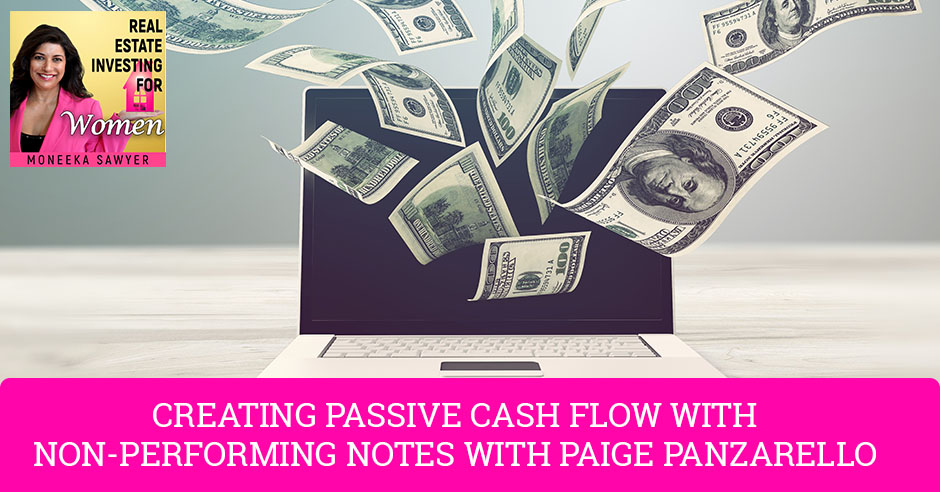
Can you imagine what it’s like $20 million dollars just when you’re starting to perform well in real estate? Paige Panzarello went through this ordeal in 2007, and it almost ended her real estate career. But now she’s bouncing back and she’s doing well with passive cash flow. And she’s doing it with non-performing notes! Listen to this episode as Paige tells it all to Moneeka Sawyer.
—
Watch the episode here
Listen to the podcast here
Creating Passive Cash Flow With Non-Performing Notes With Paige Panzarello – Real Estate Women
Real Estate Investing For Women
I am so excited to welcome to our show, Paige Panzarello. Having been a real estate investor and entrepreneur for many years, Paige has experienced many facets of real estate investing. Her experience includes founding and running her own residential and commercial construction and acquisition company.
She does buy and hold residential and commercial real estate investing, tax deeds and liens investing, and fix and flip residential remodeling and other forms, to name a few. She focuses on non-performing notes that she purchases all across the United States. Whether in residential or commercial real estate in California, Arizona or nationwide, Paige has been successful in completing over $150 million in real estate transactions to date. Welcome to the show, Paige. How are you?
Thank you so much for having me on. I’m so excited to be here.
Let’s start with your story. Tell us where you have been.
I have been a real estate investor for many years. I started my real estate investing career a little differently than most people. I literally was thrown into the deep end of the pool by virtue of inheritance. I knew nothing about real estate investing or real estate, much less investing. My grandmother passed away.
She had a rather sizable estate, half of which was in California and half of which was in Arizona. Off I went at a very young age to Arizona, knowing nothing about real estate or real estate investing. We had 38 townhome units that were only about 40% occupied. We had a sewer treatment plant and some land. I knew nothing about anything. Unfortunately, the estate was about $4 million in debt.
I was thrown into the deep end of the pool and learned quickly that all I had to do was ask questions and surround myself with people that had the answers. I was good at that and doing what I said I was going to do. If I said I was going to do something and asked the people that we owed money, I asked them to work with me, and they did. The flip side is that I was able to do what I said I was going to do. I quickly built a reputation, a good one, which was paramount.
I was able in three years to turn the properties around. We brought it back into the black in about three years. We were in a boutique market in Arizona, and I realized that we weren’t going to be able to sustain profitability. I went to my family and said, “I want to build on the land, sell the units and the sewer treatment plant.” They were all for selling the sewer treatment plant, by the way. I wanted to leverage that and go into building the land.
My family said, “I don’t want any part of that.” I said, “I want to buy the company, which I did.” I started to develop the land and hired a contractor. I realized very quickly that he was going to bankrupt me before I was even coming out of the ground. I fired him and found somebody else that would be my qualifying party. I started a construction company knowing nothing about construction. I set the pace to put us on the fast track. We were rocking and rolling. In three years’ time, we had 36 employees. We held all our licenses except HVAC and roofing.
The reason that we didn’t have those is that the insurance was way too high. We were building our own projects, everybody else’s projects, and it was great. Except that, even at that young age, I was exhausted and working myself 18 hours a day, 7 days a week, into an early grave. I was making money hand over fist. I had a lot of assets and liquidity. I thought I was having a good time, and 2007 happened.
Even if you know nothing about real estate, you can still pursue a business within the industry. Share on XThe funny thing is I saw it coming but I was naive in the fact that I thought, “This is not going to happen to me because I’m only leveraged about 10%.” I was wrong. It happened right on top of my head. Everybody that owed me money, their funding froze up. I was in the unique position that I did not have to go through bankruptcy to discharge the debts that I owed. I sold off everything that I owned. I had liquidity and cash. It took me about three years but I paid everybody off. I had a fire sale, everything. At the end of the day, I lost $20 million.
I walked away with my head held high, which was important to me. I still have investors that I work with now because of that. I wanted to make everybody else hold. That was important to me. I walked away from real estate investing for a little while, but I came back like everybody else. I had to rebuild. I didn’t have the money to put it together but I did have a good brain for real estate. I love it. I have a passion for it and a passion for helping people. I went the same route that everybody goes, wholesaling, fixing, and flipping. Some buy and hold as you grow, tax liens, and tax deeds.
I was also looking into and studying non-performing notes. About a year after I started studying it, I bought my first one. Angels sang for me. When you lose $20 million, that has a tendency to shape you as an investor. I know all of my risk tolerance. I know exactly where I’m going. When I landed in the note space, I was ecstatic because it has everything I possibly want as an investor. I never looked back.
Tell me a little bit about notes.
Notes basically are your promise to pay. There’s a variety of different kinds of notes that you can buy. I focus on the first position, meaning I’m the first one to get paid. First position non-performing notes that are secured by residential real estate. You can buy notes that are against cars. You can buy notes that are credit card debt. All those things are promises to pay.
When you finance anything, that’s your promise to pay. That’s a note. I focus on the non-performing space as opposed to the performing space. The performing space is the borrower paying their monthly payment. The non-performing space is where the borrower has stopped paying their monthly payments. My notes again are secured by residential real estate.
Why would you do non-performing?
I get that a lot, “Why on Earth would you buy a non-performing note when someone stopped paying?” The answer is there’s a variety of different reasons but the biggest one is that we would get a big discount. When you buy something at a steep discount, you build in a cushion of equity. That gives you power and control where you can mitigate your risk. After 2007, I was all about power, control, and mitigating risk.

Passive Cash Flow: Ask questions and surround yourself with people who have the answers.
As an investor, can you make money with non-performing notes? How does that work?
When we buy a non-performing note, there is a face value of the note. The Unpaid Principal Balance is also called the UPB. Let’s say that’s $100,000, but the market value of the property is only $80,000. That note is underwater. Those borrowers are underwater. When I buy a note, I buy it based on the current market value of the securing collateral, also known as the house. It’s $80,000, and I will buy it at a deep discount from there. It used to be we were able to buy notes anywhere between 40% and 50%, sometimes even a little less. Now it’s hovering around 55% to 60%, still quite a nice size equity cushion.
For that same $80,000 house, I’m spending $45,000 for the note. They will buy and build in a huge equity cushion. The borrower still owes me $100,000 because the unpaid principal balance is $100,000. I have a lot of flexibility and maneuverability to work with that borrower to either get them to reperform and start paying on their mortgage or sometimes our borrowers will give us what’s called a deed in lieu of foreclosure. They don’t want the house anymore but don’t want the foreclosure on their record.
They will deed us the property as payment in full. I can turn around and sell that house for $80,000 because that’s the market value of the property. That’s how I make money as a note investor in buying non-performing notes. The best part, though, is if we get it to reperform, not only am I generating chunks of cash. I’m also generating streams of monthly cashflow. I’m creating two different avenues of money coming into my pocket in the same vehicle, which is tremendous as far as I’m concerned.
Tell me a little bit more about that. How does that work?
In terms of the reperformance or the exit strategies because we have 23 different exit strategies in note investing. Remember, I’m risk-averse. With 23 different exit strategies that are avail, we are able to mitigate that risk. Were you asking about the reperforming situation and how we generate chunks and streams of cash?
Yes.
Getting a borrower to reperform is my favorite exit strategy that we use. It happens about a third of the time. We generally only use four main exit strategies but we still have 23 at our avail. Everybody knows about foreclosure. That’s one of our exit strategies. Sometimes, we have two. Short sale, everybody knows what a short sale is. It’s $100,000, and the borrower comes to us and says, “I have somebody that’s willing to buy it for $80,000. Will you accept it?” How fast do you think I’m going to say yes?
When you say something you need to do, just do it. Share on XDeed in lieu of foreclosure, I’ve already explained. The reperforming situation is my favorite. The borrower comes to us through our loss mitigation team. This is something I understand that I have a team in place. I have direct contact with our borrowers because I’ve got a very big heart, and everybody has got a story. I am not a licensed debt collector. The team that I pay is licensed, debt collectors.
They know all the CFPB rules and regulations. It’s well worth the small fee that I pay them per asset, per month, to deal directly with our borrowers. They are the liaison. Through our team, we talk with our borrowers and let us know that they want to stay. Let’s say that the same unpaid principal balance is $100,000, the house is only worth $80,000, and they haven’t paid for 2 or 3 years.
We get a lot of these that haven’t paid 2, 3, 4, even sometimes longer. They now owe us another $20,000 between arrearage, and maybe we have fronted some property taxes, so we don’t lose our collateral that’s securing our invested dollars. Let’s say the total amount due, the total legal balance is $120,000 but the house is only worth $80,000. There’s $40,000 on the hole.
They say they want to stay, had a medical condition, whatever, but now, they can pay. We are in a position where we can go to that borrower, and eventually, we do this through what’s called a forbearance agreement. We don’t do a permanent loan modification immediately. The borrower hasn’t paid for a while. They have to have a little skin in the game.
We will say to them, “We are going to require a reinstatement fee.” It’s usually somewhere around $2,500 to $5,000, depending. Believe me, when people want to stay in their homes, they figure out a way to come up with that money. There’s that chunk of cash. We will say to them, “We will put on hold the $40,000 that is underwater.”
We will do the forbearance agreement and a trial payment plan. You pay your reinstatement fee. We can do so many different things. We can lower interest rates and payments. We can create a new amortization schedule. We can stretch out their payments and make their payments lower. We can forgive some of the principal balance.
We will work out a payment plan that works for that borrower that works for us in terms of our numbers as well. If they pay for the first 4 to 6 months on time, every time, we will take half of that $40,000 and forgive it. If they pay on time, every time for the next 4 to 6 months, we will forgive the other half. At that point, we will put a permanent modification in place at $80,000, which is the market value of the property.
It is a more manageable mortgage for our borrower, at $80,000. We’ve created a chunk of cash at the beginning of this whole process. We’ve monthly cashflowed every single month. There are your streams of cash. At the end of the twelve months, we have a decision to make because we now have what’s called a season’s note.

Passive Cash Flow: When you buy something at a steep discount, you build in a cushion of equity and that gives you power and control where you can mitigate your risk.
There are plenty of note investors that are out there that like the performing notes because they like the monthly cashflow but they don’t want to be a landlord. They don’t want the tenants and toilets. They are willing to buy that performing seasoned note from us. We slightly discount it to another note investor. They are willing to buy that close to close to par, which is close to the $80,000. We will discount it a little bit and give them an equity cushion. You can see how that’s very profitable or we can hold onto it and keep cashflowing it. We do choose to do that as well.
That’s one of your exit strategies. I can totally see that you have a big heart. You want people to be able to keep their homes, and I feel the same way. It’s beautiful.
Especially after the 2007 crash, I have had life happen to me, and sometimes I have to take off my heart hat and put on my hard hat, and that’s never fun to do. My goal is to set out to help people. I’m in a position, by becoming the bank as a note investor, to do that for those that qualify, and not everybody qualifies but that’s a big thing for me.
You told us a little bit about your exit strategy, why don’t you walk us through the steps of acquiring a non-performing note?
Acquiring a non-performing note is very similar to any other type of real estate investing. There are two things that everybody looks for in real estate investing. One is deals, and the other is money. Note investing is no different. It’s about your network and networking. I like to think of investing as a more gentle form of real estate investing.
There is competition but it’s not nearly as fierce as the fix and flip market. You need to network. As everybody knows, your net worth is determined by your network. You need to get out there, start asking questions, start talking to people, go to REIA meetings, join BiggerPockets, and listen to podcasts. All those things are important to get you into the note space.
The interesting thing about the note space is at the asset managers. I used that word as an all-encompassing word. These are the people that handle portfolios for a variety of different sources, banks, hedge funds, other note investors, smaller commercial banks, community banks, credit unions, etc. The asset manager is the one that handles the portfolio and the disposition of the assets. Asset managers in the note space it’s very collaborative.
As you develop your relationship and your reputation with these asset managers, they will introduce you to other asset managers, which blew me away the first time that that happened to me. I thought, “Why on Earth would he do that?” You would think that there would be a lot more competition but there isn’t. That’s great too. If you do what you say you are going to do in the note space, and by the way, that is paramount, please do not waste these asset managers’ time. They do not like it, and you won’t get any more products. As long as you develop that relationship, they will help to catapult you to the next level.
You have to put action behind the desire. That's how you start. Share on XThat’s true with everybody, do what you say you are going to do. It’s also interesting how we don’t do what we say we are going to do for ourselves. There’s one thing about doing what you say you are going to do for other people but what about for yourself too? Part of building a blissful wealth empire is keeping your commitments to yourself, making yourself a priority and your promises a priority to yourself and others.
That’s such a hard thing for entrepreneurs because, as entrepreneurs, we put everybody else in front of us all the time, and it’s almost like we feel guilty if we take a spa day.
There are other ways. Yes, in the take care of yourself. That’s very important. The other thing is I’m committed to learning about real estate, and these are the steps that I’m going to take. Instead of putting off those steps, it’s to keep those promises. “Now I’m going to research notes or I’m going to send to this person to further that business.” Much of the timepieces of this can be intimidating.
It can be scary. They can feel overwhelming. Instead of keeping our promises, we procrastinate. That slowly chips away at our self-confidence. On all levels, whether it’s for your business, yourself or your family, keep your promises to yourself and the people around you. Tell me, what is the most rewarding part of investing in notes?
I get to create win-win situations for everybody. If I can help a borrower reperform and stay in their home, that is the most rewarding. We have had situations where we have had families and single moms that have a couple of kids that are going through a divorce. The big banks didn’t care. We came in and were able to help keep that family, that single mom, and her kids and their home. That is fulfilling and rewarding to me, more so than any amount of money. Having gone through and had life happen to me is the most rewarding part for me all day long.
Haven’t you loved hearing Paige talk about her notes investing strategy? Do you want to learn more from her? You can learn how to create real wealth with real estate-backed non-performing notes from June 10th to 12th. In Paige’s three-day, hands-on, interactive, virtual, and packed with information event, you will learn how to get started investing in notes so you can grow your nest egg, achieve your goals faster, retire early with peace of mind, create chunks of cash and streams of monthly cashflow. The options are endless, and you will be helping people stay in their homes.
Ladies in the green room before the show, Paige mentioned that this is the only event she’s offering this year. Don’t miss it. Otherwise, you will have to wait a long time to get this opportunity again. Take action now, so you can take advantage of this market. The opportunities in notes are staggering. See what all the buzz is about and reserve your seat now at BlissfulInvestor.com/notes. The virtual live event is from June 10th to 12th. Are you ready for three rapid-fire questions?
I am.

Passive Cash Flow: Just as long as you stand in integrity and you behave that way, people will be understanding because life does happen. Mistakes are made but don’t lie to people and don’t try and pull the wool over their eyes, just stand in your integrity, own up to it.
Tell us one super tip on getting started in real estate investing?
Take action. You can educate yourself to the cows come home but if you have analysis paralysis, you are never going to go anywhere. You got to put action behind the desire. That’s how you start.
What is one strategy for being successful in real estate investing?
This is a big one. To be successful, you have got to make the deal conform to you and who you are as an investor, not the other way around, do not ever conform to a deal. You set the guidelines, the outline, the bullet points, and what is your good risk tolerance and make the deal conform to you, do not conform to the deal.
What is one daily practice that you do that you would say contributes to your personal success?
I have integrity. We are all human. We all make mistakes. I don’t ever try and pull the wool over somebody’s eyes. If I make a mistake, I own up to it. People know when you are dealing with people and teams, money and emotions, there’s a big swirling around of all of that. As long as you stand in integrity and you behave that way, people will be understanding because life does happen. Mistakes are made, but don’t lie to people and don’t try and pull the wool over their eyes. Stand in your integrity, and own up to it. Believe me, and you will have more forgiveness and a better, stronger relationship if you behave that way. That’s how I conduct not only my business but my life.
Thank you so much for all of your words of wisdom for my audience. This show has been amazing.
Thank you for having me. I enjoyed it.
Don’t miss Paige’s upcoming three-day virtual live event from June 10th to 12th. It will be a long time before she’s going to be doing this again. Don’t miss it. Sign up now at BlissfulInvestor.com/notes. Thank you so much for joining Paige and me for this show. I look forward to seeing you next time. Until then, remember, goals without action are just streams. Get out there, take action and create the life your heart most deeply desires.
Important Links
About Paige Panzarello
 Paige Panzarello is the “Cashflow Chick”. Having been a Real Estate investor and entrepreneur for almost 25 years, Paige has experienced many facets of real estate investing. Her experience includes founding and running her own Residential and Commercial Construction and Acquisition companies, Buy and Hold residential and commercial real estate investing, Tax Deeds/Liens Investing, Fix and Flip (Residential Remodeling), and other forms to name a few. She currently focuses on Non-Performing Notes that she purchases all across the United States. Whether in notes, residential or commercial real estate, in California, Arizona, or nationwide, Paige has been successful in completing over $150 million in real estate transactions to date.
Paige Panzarello is the “Cashflow Chick”. Having been a Real Estate investor and entrepreneur for almost 25 years, Paige has experienced many facets of real estate investing. Her experience includes founding and running her own Residential and Commercial Construction and Acquisition companies, Buy and Hold residential and commercial real estate investing, Tax Deeds/Liens Investing, Fix and Flip (Residential Remodeling), and other forms to name a few. She currently focuses on Non-Performing Notes that she purchases all across the United States. Whether in notes, residential or commercial real estate, in California, Arizona, or nationwide, Paige has been successful in completing over $150 million in real estate transactions to date.
She has been a regularly featured guest on “The Cashflow Guys” podcast, and you can also find her on the “Best Ever Show” with Joe Fairless, “The Note Closers Show”, “Cashflow Ninja”, “Secrets to Real Estate Investing” and “Real Estate Investor Goddesses” podcasts, among many others. Paige has also been interviewed and highlighted in an article in the Wall Street Journal. She also speaks at various different Real Estate Investing clubs and conferences across the country.
Paige has been purchasing Non-Performing Notes (NPNs) since 2014, and she formed The Tryllion Group, which invests in Notes across the country.
Paige teaches the “Building Wealth with Notes” Workshop that drills down into the details of how to buy Non-Performing Notes, what to look for, due diligence to perform, and most importantly, how to mitigate risk. Her 10-week Master Class is a hands-on deep dive where Paige walks you through the nitty-gritty details to be a successful Note buyer.
Having experienced the hardship of the economic downturn of 2007, and what she calls “a very difficult learning experience”, Paige knows first-hand how “life can happen” to everyone. Her company was founded to help people in distress. Paige is also driven to help educate people on the importance of passive income, deal evaluation, money and debt management. She wants everyone to elevate their situation and become free of dependence on anyone or anything, so that when “life happens”, people will be ready, not broken.
Whether it is improving communities one house at a time, helping borrowers stay in their homes, or working with other investors to learn a new way to potentially earn higher returns for their investment dollars toward money cash flow or their retirement years, Paige is dedicated to helping people improve their lives in every way. She lives by the motto, “People first, profit second.”
______________________________________
To listen to the EXTRA portion of this show go to RealEstateInvestingForWomenExtra.com
To see this program in video:
Search on Roku for Real Estate Investing 4 Women or go to this link: https://blissfulinvestor.com/biroku
On YouTube go to Real Estate Investing for Women
Moneeka Sawyer is often described as one of the most blissful people you will ever meet. She has been investing in Real Estate for over 20 years, so has been through all the different cycles of the market. Still, she has turned $10,000 into over $5,000,000, working only 5-10 hours per MONTH with very little stress.
While building her multi-million dollar business, she has traveled to over 55 countries, dances every single day, supports causes that are important to her, and spends lots of time with her husband of over 20 years.
She is the international best-selling author of the multiple award-winning books “Choose Bliss: The Power and Practice of Joy and Contentment” and “Real Estate Investing for Women: Expert Conversations to Increase Wealth and Happiness the Blissful Way.”
Moneeka has been featured on stages including Carnegie Hall and Nasdaq, radio, podcasts such as Achieve Your Goals with Hal Elrod, and TV stations including ABC, CBS, FOX, and the CW, impacting over 150 million people.
Monick Halm On Building A Strong Passive Income
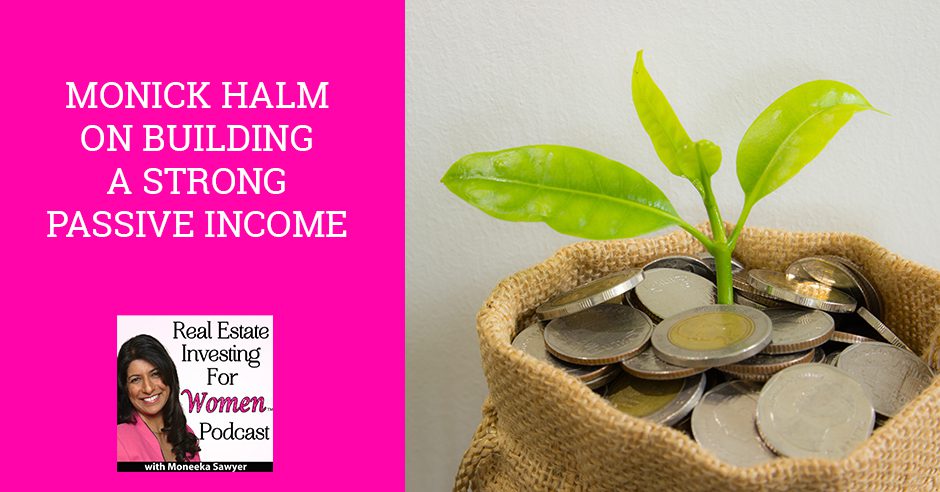
Building your finances is mostly dependent on your day job or business, but having a strong source of passive income is always a welcome addition to your books. Nothing beats having your money work for you, even if you are sleeping or relaxing at home. Moneeka Sawyer is joined once more by the Founder of Real Estate Investor Goddesses, Monick Halm, in dissecting how to make money through real estate syndication. Monick explains how this industry works, how to choose the people to collaborate with, the risks every realtor must be wary of, and how it can help lower tax bills.
—
Listen to the podcast here
Monick Halm On Building A Strong Passive Income
Real Estate Investing For Women
We are going to do things a little bit differently. I am bringing back to the show, Monick Halm. We’ve had her on the show before. I had an interesting conversation with one of you guys. The question was, “I have money in my retirement program. I cannot afford to lose it, but I want to have high returns because you’re 65 and you want to retire soon. You can’t afford to lose the money, but you want to get high returns with very low risk and you want to be very hands-off.” That was a tall order and I had no idea how to answer you, but I do have resources. Monick is the resource that I reached out to because I know that she talks about ways to invest with high returns, low risk, and hands-off.
I wanted her to share her expertise with you ladies. It was very funny because I got that one question and then in the same week, I got a very similar question from somebody else. It’s funny how things come in groupings. This is the topic that people want to hear about. I’m excited to present this to you. I’m going to have her introduce herself. I know you ladies have met her before because she’s been on the show.
I’ve also asked her to do a full presentation because I want to make sure that I’m not interrupting and she captures everything important for you ladies to know. It’s going to be a little different than normal. She’s doing a presentation and I will interrupt with some questions. The other thing is she is doing a slide show. If you’re a visual person and you want to see the slides, you can go to YouTube and look at Moneeka Sawyer or Real Estate Investing For Women, and then you’ll be able to find this. You can also go to Roku with Real Estate Investing 4 Women. Monick, welcome back to the show.
Thanks for having me back to talk about one of my favorite things. I love to invest in real estate. I found it a little bit by accident, which I’ll talk about that. I’m going to be talking about real estate syndication, how to passively invest in real estate, earn double-digit returns, and not have to deal with the 3Ts. The three are tenants, toilets and termites. This is a way of possibly investing in real estate that is high return and lower risk. Nothing is risk-free, I want to start by saying that. I can’t guarantee you returns. If anybody says that they will guarantee you a return, then run in the opposite direction and we will guarantee it. This is a relatively lower risk investment and I will share why.
Before we get going, I’m going to briefly introduce myself and why I talk about this. I am a real estate investor and a syndicator. Syndication is crowdfunding real estate. I bring groups of investors together to purchase real estate. I’ve been in real estate for many years. I have a little over 1,300 rental doors in seven states. I’ve raised over $35 million with my partners since 2016 for a real estate portfolio worth over $220 million. I’ve written the book, The Real Estate Investor Goddess Handbook, Wealth for Women: Conversations with the Team That Creates the Dream and Investing in Real Estate from $1 to $1 Million, which is available as a digital download for free on my website, REIGoddesses.com. I also have a podcast, Real Estate Investor Goddesses Podcast. I’m a real estate investment mentor, educator and coach. That’s me in a nutshell and a little bit of my background for why I’m talking about this.
First, let me briefly describe what is real estate syndication. In the simplest term, syndication is a structure or relationship between multiple investors pool money together to fund a project, real estate or otherwise. Investing in real estate syndication is investing in a real estate enterprise as a passive investor alongside multiple other investors. We crowdfund or bring together a group of investors that will passively invest. We’ll talk a little bit more about what all of those different roles are.
First, is syndication something for you? Maybe you can relate. If your real estate vision is big but you’re not sure if your bank account balance is big enough to fund it, then you might be interested in syndication. If you have some money set aside but you’d like to be able to leverage it and spread the risk, you don’t want all your eggs in one basket, then syndication might be a good fit for you. If your life is full and you’re not sure if you will have the time or other resources necessary to successfully invest, syndication could be a fit for you.
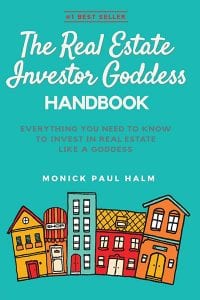
The Real Estate Investor Goddess Handbook: Everything You Need To Know To Invest In Real Estate Like A Goddess
If you fit any of those things, I understand because that’s where I was. I wanted to share my story, which you may relate to. Like Moneeka, I’m a first-generation American. My parents are from Haiti and I have super supportive parents who are always like, “You can be anything you want (as long as you’re a doctor, lawyer, professor, engineer).” I wasn’t into Maths and Sciences. I went to law school. I ended up at Columbia Law. On my slide, I have a picture of me in Japan, walking to my firm there. I was working for a big international law firm, partnership track, six-figure income. I checked all the happy immigrant parent boxes. I’ve done everything right.
I was miserable that at one point, I found myself in the emergency room. I remember the Tuesday morning when the doctor told me that my appendix had ruptured. I had to spend several days in the hospital. I ended up spending nine days in the hospital. He said I’d have at least 30 days afterward to recover. My first thought when he said that was, “Thank God, I don’t have to go to work for at least 30 days.” I had this incredible sense of relief.
It didn’t hit me until that second how unhappy and miserable I was. I couldn’t take it for granted that I was meant to be that unhappy, but it took that moment to give me clarity that it’s not normal, not good and not okay. I had done exactly what I was told. I had followed the path exactly and I was miserable and unhappy. I knew I had to find a different way. They don’t know what causes appendicitis, but I was sure it was stress from my job. That job was killing me and I had to find a different path. That was not an easy thing to do because I did the path that I was told would lead to success.
I did the path that my parents believed would lead to success. They didn’t know better. They taught me what they knew. I fell into real estate completely by accident. The only thing they had ever taught me was to buy my own home. That was what they knew about real estate. Moneeka, you were lucky because your parents knew about real estate investing. You were born into it but I was not. All my parents knew was get a job, trade your time for money, and buy a house that you live in but it gives you no money.
At least they said, “Buy a house.” I don’t know how many people whose parents didn’t even know that much. You had so much. It sounds like your parents adored you and wanted the best for you.
They’re great parents. I love my parents. They did the best they knew to do. They taught me the best they knew and were they very supportive.
I wanted to highlight something that you said which I think is valuable. Ladies, this is something to think about. We’re talking about real estate, but one of the things that Monick found in that hospital, and I know I’ve been here too, is how do we define success? She did everything right. I did the same thing. I did everything right. Our parents told us what success was going to look like and how we were going to get there because that’s the best that they could do. That’s what they knew. The way that they define success is different than how we define success. We have had to create a new life based on our vision of success. That’s an important key for you ladies to keep in mind. How are you defining success? I love that Monick was talking about, “This might be for you if.” If that is you, how are you defining success and what are the next steps? I want to highlight that success looks different for everybody.
Success is doing what you love, with whom you love, and when you want to do it. Click To Tweet
For me, success is being able to do what you love with who you love when you want to do it. After having spent lots of time doing things that were killing my soul, that was what it felt like being a lawyer, and it’s killing my body too. After having spent that much time being miserable, having now the freedom to do work that I love and I’m passionate about. I have passive income streams and I don’t have to work if I don’t want to do. I get to make a difference, spend time on vacation, and do all of those things that I want to do when we’re allowed to leave the country, then I have freedom. That is success, but I didn’t start there. I got there by a series of happy accidents.
I was sharing that when I went to go buy my home. This was in 2005 towards the top of the last bubble. I live in Los Angeles, a very expensive market. You understand being in an inexpensive market. Those of you out there in the much cheaper markets can conceive of the prices that we have to pay. Even back in 2005, a starter home in a semi-decent neighborhood was upwards of $600,000 to $700,000. I had a low six-figure income. That was challenging for me. A friend of mine who was in a similar boat suggest that we buy a duplex together. He would live on one side, I’d live on the other side. The original plan was to get a property with two equal sides. We ended up finding this old craftsman that had a larger downstairs unit, a two-bedroom unit upstairs. It had a converted garage in the back with a one-bedroom. We ended up each taking a bedroom in the bigger unit. We’re renting out upstairs, our back house and even our basement. We started the house hack before I knew that was a thing. I went, “This is awesome.” People are paying our mortgage and I got tax benefits.
I met my husband. He had a duplex and we got a single-family rental together. After the market crash, we started to flip houses when houses were on sale. Houses are bound to be on sale again, so get ready. It’s going to be a very good time to be a real estate investor. By 2015, houses were not on sale. It was getting frustrating. Flipping houses is a short-term job. It’s like a short-term contract. You do it, fix it up, sell it at a profit, and then you have to start over. I wanted something more passive. I started to look for a fourplex, which at that time was the largest thing I could think of. In LA, you cannot find anything that cashflows. It was impossible because it was going to cost a fortune, and there was no money coming back from that. I ended up being introduced to this man that would become my mentor, Robert Helms, who is the host of the Real Estate Guys Radio podcast.
He’s done over a billion dollars’ worth of transactions and we had a mutual friend. When I was telling our mutual friend, Kyle, how frustrated I was. He said, “My friend Robert Helms is going to be in LA tomorrow. You should come and meet him.” I met him and he’s the one that changed everything. It’s one ten-minute conversation and it’s why I’m here talking to you. He is super nice. He asked what I was doing. I told him about the flipping and how that was getting challenging, and that I’m looking for fourplex in LA that would not cashflow. He said, “LA is a tough market. Live where you want to live, but invest where the numbers make sense.” That makes total sense after you hear it.
I always thought you had to invest where you could drive to your property, touch it, self-manage it. It never crossed my mind that I could invest outside of where I lived. That opened up the world to me. The other thing he said was, “You can buy that fourplex by yourself, but you’re limited to your own capital credit. Alternatively, you could bring a group of investors together and you get 100 or 200 units.” He started telling me about the benefits of that. My brain exploded right there. I was like, “That’s a thing? You could do that?” Everything in my body got chills. I’m like, “I want to do that.” That was very exciting for me to find out. I went home and told my husband that night, “There’s a thing called syndication. We need to learn how to do that.”
The Real Estate Guys, Robert Helms and Russell Gray were teaching a seminar on it in January 2016. We went to that seminar and signed up with their program. We met Brad Sumrok who was our apartment syndication mentor. We signed up with him. We went to tons of different events throughout that year and since to learn how to do that. I invest over $60,000 just to hear that education but it paid off. We ended up syndicating and getting into a 109-unit mobile home park in North Carolina. We did 318 units in Dallas, 514 units in Atlanta, and then 50 to 51-unit townhome community, and then 77-unit apartment community in Albuquerque all in that first year. Over 1,000 units in that first year through syndication, through bringing investors together.
You take things slowly, don’t you? Are you saying only two of those were passive?

Passive Income: Syndication allows you to spread the risk because money is not all unused.
We syndicated the mobile home park and the two in Albuquerque. We still passively invest in things as well as actively invest. There are benefits to both which we’ll talk about. Other than the mobile home park, all of those things have been sold. We have new ones. We have a little over 1,300 in different asset classes, different states. It’s allowed us to diversify, to scale and grow in a quantum leap and ways that I had never imagined possible. I’m very passionate about it. I have a picture of a slide. I’m wearing a Tiara, but I’m surrounded by a bunch of men, which was the mastermind that I was in.
Being surrounded by many men in that field. First of all, 90% of our investors were men. I had been working with women, but it came as this divine download to bring women into this game, especially invite them into syndication. I created Real Estate Investor Goddesses to bring women into this game. My mission of helping one million women create financial freedom through real estate investing came as this divine download, not the how of it. I’m still figuring out the how. I’m ways from that, but the what of it has come. It’s been great. Little words have been going out. I’m very passionate about getting more women into this wealth-building lucrative game.
One of the ways that’s great for women with syndication is because a lot of us are busy. We have jobs where we have to homeschool. We have parents to take care of, kids to take care of, and all of this stuff. This is a way of being able to get into real estate that is passive, that doesn’t take time past vetting. Some of you might be interested in being on the other side of it too, where you get to bring groups of investors together. You can benefit a lot by being on the active side, which is the side I mostly play on. Either way, there are a lot of benefits. Why would you want to do that?
It allows you to buy more than what you can afford by yourself. As a passive investor, you get to leverage OPM, Other People’s Money. It’s not just your money, it’s the money of all the other investors, and often a bank too. We usually get financing, as well as all of these investors that come in. You’re able to leverage OPM to get something much bigger than what you could afford by yourself. You also get to leverage OPT, Other People’s Time because somebody else is going off, finding the deal, putting it together, and bringing all the investors together. You have to vet the deal and then send in your money and wait for it to come back with friends. It allows you to spread the risk because it’s not all on you.
The risk is spread. Also as a passive investor, you have very little to no liability. You spread the wealth. As a syndicator, I get to create an opportunity for many people to benefit. As a passive investor, you get all the benefits of being a real estate investor like the tax benefits and otherwise without the work. With a real estate syndication, there are a lot of benefits. It gives you the benefits of passive cashflow. You get a share of the monthly cashflow. You get a share of equity at the end when we sell. You get federal tax benefits. A lot of people don’t realize that. You have the assumption that the more you make, the more you pay in taxes. That’s what we’re told.
Higher-income, more taxes except when it comes to real estate investing because of the way it’s structured in the tax code. You often end up paying less. A lot of people will get into real estate, especially when they have businesses and they’re successful. A good stabby CPA will say, “You should start investing in real estate because you’re paying too much in taxes.” Even though you’re making money with your real estate, because of the way real estate looks like a loss for tax purposes, you’ll pay less.
I have a very good friend. He’s a successful businessman. He found himself one year owing $500,000 to the IRS. He had always assumed, “The more you make, the more you pay in taxes.” He was very successful with multimillion-dollar businesses. He found out about real estate. He bought an apartment building in Memphis. It was an apartment that he was making six figures a year of income, but it brought his tax bill from $500,000 to $0. He was making more money. Not only did he make money, but he saved on the money that did not have to go to Uncle Sam. It’s not just what you make, it’s what’s you get to keep. In real estate investing, even as passive investors, you get to keep more.
Live where you want to live; invest where the numbers make sense. Click To Tweet
I’ve said on this show many times that no matter how someone became rich, the rich always invest in real estate. That’s where they make the majority of their money. They make a huge amount of money in real estate. They also save a lot of money in real estate, which they can then grow in other ways, whether it’s in their business or real estate. Monick has given you a cool breakdown of why the rich invest in real estate. What’s cool about real estate is that you don’t have to be rich. This is available to everybody, especially here in the United States. This is the most amazing country that way because this is not through elsewhere. The government supports everybody from a single mom, all the way to the richest person on the planet and investing in real estate. We’re supported to do that. It helps us to grow well, and it helps to lower our tax bill. There are many good reasons to invest in real estate.
The government wants you to invest in real estate. That’s why they give these incentives in the Tax Code. It’s to get more people to invest in real estate. There’s a book called The Color Of Law. It started in the 1940s after World War II. They thought that if people owned real estate, they would be capitalists but they would not be communists. It was a way of helping stop communism. Whatever the reason, it’s a good thing if you’re a real estate investor. It helps you out. People who have a lot of money shift from being about income to being about wealth preservation. Real estate helps you preserve wealth, not just because it appreciates some of these other benefits, but because of the enormous tax benefits that help you not just save money off of your real estate income, but it helps you pay less on more of your income. It is beneficial tax-wise.
I was talking about you can leverage OPM, Other People’s Money and Other People’s Time. When you’re in syndication, you’re able to do much bigger properties in their economies of scale and leverage in that way. Retirement savings came up because people are saying, “I have this money in my retirement account. I’d like to be able to find investments that make sense, that are lucrative, that are relatively safe, and with self-directed retirement accounts.” Not the account that your work’s going to put you in normally, which gives you a very limited menu of things that you can invest in some mutual funds and bonds.
It’s like this little menu, but if you can self-direct your money, then you can put it into real estate and get better returns. Also, with appreciation. I start with real estate. You get appreciation over time. Properties tend to go up in value, but you can also force appreciation by doing targeted rehab, which is what we do with syndication. We have a business plan and we buy property. We have a plan to add value to that property and appreciate the value. It’s worth more generally after a certain number of years. We’ll sell and be able to recapture that. Even on paper, as the value of the building grows so does your net worth. It allows you to leave a legacy, which I know for many of us, one of the main reasons why we want to do this. Real estate since time immemorial has been the main way that people have built, preserved and passed down wealth.
It remains the same way. That’s one of the best ways to build and leave a legacy, and it’s a feel-good business. It’s a win-win. I only invest in ways in which I can leave a property in a community better than we found it. Our syndication is a focus and it feels good. It’s a wealth-building opportunity for everyone touched by our deals. That’s why I love it. Those are the benefits. Think about what are the benefits for you? What’s your why behind real estate investing and syndication? Depending on what are the whys that are important to you, there are certain deals that will give you more of those benefits or less. Tap into your why behind them.
What types of properties can be syndicated? Anything can be syndicated. You can syndicate debt. Sometimes, it’ll be a fixed return. It’s debt and a loan that we’re syndicating. You can syndicate equity. Ownership’s take in a property. You can syndicate raw land, single-family, residential properties. Syndication is for larger commercial projects. There are a lot of expensive legal works that has to be done. I’ll talk a little bit more later about the legal ramifications of this. It’s not something that I would recommend you to go out and ask a bunch of people to give you money for a deal.
It’s governed under the Securities and Exchange Commission and it can be pricey to put one of these together. The deal has to be large enough to justify the legal costs of putting together syndication. You won’t find a single-family residential property syndicated usually unless it’s going to be used for something like a residential assisted living facility. A facility where people are paying upwards of $4,000 a bed to be there and it’s a very high cashflowing business. You’d see those get syndicated, otherwise, it’s just a house to flip. You normally won’t see that, but they could be if somebody wanted to do that. Multifamily apartment complexes are common, office space, retail and industrial can be syndicated.

Passive Income: As a passive investor, you get all the benefits of being a real estate investor without doing all the work.
Who’s involved in the syndication? You’re going to hear the terms syndicator sponsor, active investor, general partner. Those are all used interchangeably. That is to describe the individual, company or team that’s finding, acquiring and managing the real estate. They’re going to have a history of real estate experience. They should. If they don’t, do not do this with them. They have to have extreme real estate experience, and the ability to underwrite and do due diligence on the properties. The active investors are the ones doing the work. There are joint venture equity partners. Sometimes that’s my role in deals. We have a group of investors and we’re not on the operation side, but are bringing in funds for the investment. We’re connecting our investors to operators that were part of the sponsorship team. With JV or equity partners, it might help with financing, reporting communications and tax documentation.
Last but not least, there are passive investors, sometimes called limited partners. Those are individuals who will invest in the syndication. They own a percentage of the real estate as a result. If it’s an equity deal, they’ll have a percentage. They’ll be part of the loan if it’s debt. You get all the benefits of property ownership, not involved with acquiring the property, arranging to finance or doing any of the day-to-day management. They cannot be. Think of it more like if you’re buying stock in Apple. You own a piece of Apple when you have a piece of their stock. If they do dividends, then you would get your dividends. Otherwise, you have that ownership stake, but you’re not going to call the company and say, “I want you to change this feature on the iPhone.”
You could just like our passive investors can call us and tell us what they’d like to change, but in terms of like, who’s managing it, who gets to decide, when to sell, what to do, who’s the team, that’s on the active investor side. I’m going to share a typical example of a 100-unit apartment building. I’m going to round out the numbers to make this easier to understand. This is not a guarantee of results, but this is not atypical for syndication. It’s fairly typical in terms of returns.
This one was a deal that was a $5 million purchase price. The rehab budget was $500,000. We were buying this apartment building. We’re fixing up the units and getting them nicer so we could raise the rents to market rates because it was underperforming. We got a loan, 75%, $4.1 million to $5 million. The interest rate was 5% at that time. It’s lower now. We had a down payment of 1.375%, closing costs of $200,000 and the cash starts with the $75,000. We were raising $1.6 million to $5 million. Rounded at 33 investors at $50,000 each.
I won’t go through all of the various numbers. I’ll highlight the end result for the readers. After the total cashflow, the whole profit was $51,575 after five years. More or less doubled the money of the investor after five years. About $23,500 was in cashflow. Sales proceeds were close to $78,000. That was the profit. Not bad for something that is passive. That is not atypical for these types of syndications. On the active investor side, that also invest $50,000, the same deals as an active investor that you get a share of the cashflow and the acquisition fee. There’s also an asset management fee, and you get a share of the equity and cashflow for putting together the deal, and then there are fees for managing it.
In this case, as an active investor, we’ll also put in $50,000, which had the same profit that the other equity investors did, $51,575. There’s a 3% acquisition fee of $49,500, 1.5% asset management fee, $60,257, 15% deal sponsor equity share of $116,700. The total sponsorship return was $287,032 on a $50,000 and sweat equity. There’s a lot of sweat equity in that, but that’s the return. If there was a team doing it, then all the acquisition fee has some management deal sponsor equity. It would be split amongst the team members. You can get three times or more of the returns by being on the active side and doing the deal. It can be very profitable either way. Does this sound like something you might like to try?
One of the nice things about it as a passive investor, you have to vet the deal and then wait for it to come back with friends. For those of you who are interested in being on the active side, do not try to do syndication without a qualified securities attorney. You could win yourself a hefty penalty, an orange jumpsuit, and some jail time. You want free housing but not that way. Make sure you know what you were doing when you take on other people’s money. You can’t advertise an opportunity there. It’s very regulated in terms of who can invest with you and how. Generally, it’s going to be people with whom you have a substantial pre-existing relationship, and they have to be sophisticated enough to understand the deal, or you’re only dealing with accredited investors.
Only invest in ways in which you can leave a property in a community better than you found it. Click To Tweet
For those of you who don’t know what an accredited investor is, some people think it’s like, “I’m not accredited. I haven’t taken the test. I don’t have a certificate.” There’s no certificate nor test. You qualify either through your income or through your net worth. If you have an income as an individual of $200,000, or as a married couple of $300,000 per year, you’ve had it for at least two years with a reasonable expectation that you will in the subsequent year, you are an accredited investor. If you have a net worth of $1 million or more, not including your primary residence, then you are an accredited investor. You are part of the 8% only of the population who are. Most people do not fall under that. If you do, you’re an accredited investor. That will allow you to take advantage of more of these types of opportunities.
Some of them are for accredited investors only. Some are for both, but you do have to have a preexisting relationship with the person bringing the deal. If you are trying to syndicate, then you need to understand when you can do and take accredited investors or when and how you can take people. If somebody is talking about this on Facebook, unless it’s accredited investors only, they could do that. You can’t just take anyone’s money, even if they want to invest it with you. I’ve had certain deals where we had to have that pre-existing relationship. They come and I’ve met them after I have already the deal. They’re like, “I’ve wanted to put money into it.” I’m like, “I wish I could take your money but I can’t. We’re going to get to know each other now. Next time you could if you feel like it, but I can’t now.”
If you want to find out more about these passive investing strategies, we have an investor club at Real Estate Investor Goddesses. I created this club because I wanted to get more women in knowing about these types of opportunities. The investor club doesn’t cost anything to be part of it, and you’re not obligated to do anything, but it allows us to get into that pre-existing relationship, and you then get access. A lot of people are like, “How do you find out about this? How do you get access?” You have to get into a relationship with a syndicator. I deliberately set out to get more women into this game because when I started, 90% of our investors were men. Now, I’m happy to say 90%-plus of our investors are women. I love being able to get more women into this because they’re great investments. I’ve done better on my passive investments than I ever could have done investing in LA or these expensive markets where I was doing all the work. They can be lucrative.
Let me talk a little bit about the risk for a minute because there is a risk. Here’s where the biggest risks are and how to mitigate the risk. They can be great opportunities. It’s important that you invest with the right people because a team is everything with real estate. There are three things to look at in order of importance. First is the team, next is the market, and next is the property and the plan. It’s in that order of importance. Your team is very important. You want a team that has a good track record and trustworthy. A good track record does not mean they’ve never lost money. Robert Helms would say that he would not invest with anyone who had not lost money before. He wanted to invest with somebody who had lost money and stayed in the game. He wanted to know, what happened when it went bad? How do they deal with it? Are they still playing in the game?
Things happen like in 2008. It was very bad for lots of people. There might be some deals that people bought, but not quite as right in 2019. It might not be doing so well right now. How are they handling it? How are they going to get through it? That tells a lot about somebody. It’s not necessarily that people have a perfect as they’ve never had a miss. That’s not a bad thing, but you want to know that they’ve been able to handle it. They have a long track record. They know what they’re doing. They’re trustworthy, following the rules and doing it right.
The team is important, then the market. Where are they investing? You start to look at their business plan. What is the property they’re looking at, and some of the assumptions they’re making? Some people make some assumptions like I like to be underpromised and overdelivered, but not everyone has that. How are they underwriting? Those are the things. You’re going to want to be able to vet the people or get the deals. Make sure it makes sense for you. If it does, then you raise your hand and say, “I’m in.” You invest and wait for your money to come back with friends. That’s how you do it. It’s a good deal. A lot of these deals are because we tend to buy properties that are ready cashflowing. They’re already stabilized. They’ll plan to increase cashflow, but when things tend to go bad, you may not meet the mark that you wanted to, but it’s unlikely that you’ll lose your money. That’s why they’re great investments.
Are most of your projects five years?

Passive Income: Realtors save a lot of money in real estate, which they can grow again in other ways, whether in their business or more real estate.
Five years is a fairly typical polled plan period. For the past few years, we were getting out more quickly because of the way the market was going. We’re paying more money for the same amount of income. It became a very good time to be a seller. I liked to be a seller when it’s a seller’s market and a buyer when it’s a buyer’s market. We started to sell because we could hit our returns more quickly. If you hit your number quickly, it’s better if I could get somebody 100% return in 2.5 years versus 5. We were selling more quickly when it made sense.
Now, looking at where the market is going, it might be closer to our five-year period or it might not make sense to sell in five years, and we may hold on for 1 or 2 years. As the sponsors, we’re going to do what’s best for our investors and we’ll sell when it makes the most sense. If it doesn’t make sense to sell it, we’re going to sell it down at a loss, then we hold off because we’re always cashflowing. That five-year plan might become a seven-year plan depending on what’s happening in the economy. Sometimes it’s a 2 or 3-year plan if that makes sense.
Is there a particular class that you invest in?
Most of our investments are in class-B multifamily. We’re also doing a lot of industrial. We’re doing more industrial right now. There’s a lot of uncertainty in the rental market because more people are losing jobs and not able to work. That’s harder, but industrial is one asset class that has been least affected by what’s going on. One of the things that we’re doing a lot of are types of deals called Sale-Leaseback. It’s a company that has a facility. In 2020, we did a frozen pie company and we ended up getting a baby food company. We have a couple of others. They are business that are doing super well in this crazy economy. They have these facilities that they had built and they wanted to get equity out of them.
They couldn’t refinance to get the equity that they needed. They’re selling it, but then they lease it right back as our tenants with these triple net leases. What’s great about triple net lease is they tend to be very long. These are twenty-year leases that we have with our sellers/new tenants. Not only do they pay rent, but they also pay property taxes, insurance, and all of the maintenance. They take care of all of the expenses with the exception of any debt service. If we have loans on the properties, they’re not going to pay for that, but all other expenses they cover. There are no surprises.
We have built-in rent increases in the leases as well year over year. You know what the income’s going to be, what the expenses are going to be. The plan is we sell them to institutional buyers after 3 to 5 years, and very similar returns to multifamily, cash-on-cash returns in 8% to 10% range with cumulative annualized returns in the high teens, low twenties. They liked them. They feel safer and more stable, especially in this type of climate. We’ve been doing these.
How do you find those?
We have partners that have been doing this for close to two decades. They’re one of few people who do this. It’s a very niche segment of the market, which is great. I don’t like going where the herds go. I try to look away from where the herds go, into places that are a little more open pasture. These companies will contact our partners. The big part of the due diligence on these is on the company to make sure that it’s a company that’s going to last a long time. The good thing about these long triple net leases is you have a tenant in there and it’s super easy. There is almost no property management and very little to do. If you do lose a tenant, it can take a while. Sometimes months or a year or more to find a replacement. The important thing is to have a steady tenant that’s not going to go anywhere. We do a lot of due diligence on those tenants to make sure the seller/tenants, the company is solid, and then we do the deal.
How big is a deal like this usually? How many investors are you looking for and how often do you do these?
They will vary. We’ve done syndications where we’ve raised as little as $500,000 and as high as $8 million. It’ll depend on the raise. A fairly typical minimum investment is $50,000. We have had somewhere that was $100,000 minimum, and we’ve had a couple where it was a $25,000 minimum. Generally, $50,000 is a fairly typical minimum.
How many of these do you do per year? How often can someone get into this?
Always know what your resources are, what you can invest in, and where your funds are. Click To Tweet
Our goal in 2020 has been to do two a quarter, but because of COVID, we’re about to do our fourth one for the year.
At least, they’re coming through. That was amazing. There’s so much information. That was super helpful. If you had one tip to give my ladies about investing in syndication, what would you say?
If you want to do this, then you need to get on the list of people who do syndications. Connect with people. We have our women’s intuition. Tap into that as well as you’re learning. Find people that you think you know. Get to know them who you can like, trust and can do a good job with syndication. If you’re passively investing, that’s the only way you’re going to get access is to get into relationship with people who have these types of deals. This is part of the conversation I have when people apply to get into the investor club. We can help them over the phone.
I get clarity on their why. Why do they want to do this? Depending on their why, different investments will be a better fit for them or not. It’s important to tap into your why. It’s important to know what your resources are, what you can invest, where your funds are, and have that clarity about where your money is, and when you need it. If it’s money that you’re going to need in 1 or 2 years, if you’re 65 and you want your money in two years, a deal where your mind’s going to be locked up for five years is probably not the best fit for you.
If you’re going to need it that quickly, there will be cash. If you’re okay with the cashflow or something happens, then that’s fine. It could be 5 or 7 years, depending on what’s going on. It could be less, but it could be more. You need to get a sense of when you’re going to need the principal back and make sure that it all makes sense for you. We would have that conversation on our call so I could get clarity and make sure that you’re getting into deals that make sense for you.

Passive Income: You can’t just take anyone’s money when syndicating, even if they really want to invest it with you.
Why don’t you tell everybody how they can get in touch with you?
To join the investor club and get into a one-on-one passive investing strategy session with me, ladies can go to REIGoddesses.com, and gents go to Vip-Assets.com. When you go on there, you’ll understand.
That’s helpful. Thank you for coming back to the show and sharing all this information with us. It’s valuable as always.
It was my pleasure. Thank you for having me.
Ladies, thank you for joining Monick and I for this conversation. I hope it was helpful. I know we did a little bit of a different format, but I hope you got a lot of great information. Contact Monick if this is a strategy that you’re interested in. I look forward to seeing you next episode. Until then, remember goals without action are just dreams. Get out there, take action, and create the life your heart deeply desires. I’ll see you soon. Bye.
Important Links
- Monick Halm
- Show – Previous episode
- Real Estate Investing 4 Women – Roku
- Moneeka Sawyer – YouTube
- The Real Estate Investor Goddess Handbook
- Wealth for Women: Conversations with the Team That Creates the Dream
- Investing in Real Estate from $1 to $1 Million
- REIGoddesses.com
- Real Estate Investor Goddesses Podcast
- Real Estate Guys Radio
- The Color Of Law
- Real Estate Investor Goddesses Club
- Vip-Assets.com
About Monick Halm

Monick Halm is an expert, educator and advocate for women real estate investors, with a personal mission to help 1 million women create financial freedom through real estate.
She is herself a real estate investor, syndicator, and developer with over 15 years of real estate investing experience in single-family rentals, multi-family residential, mobile home parks, and flipping. Her current investment focus is on syndicating under-performing residential multi-family apartment buildings and mobile home parks. She delights in adding value for her investors and tenants through improved management and the targeted remodeling and rehabbing of properties. Together with her investors, she owns over 1300 rental doors.
She is also the founder of Real Estate Investor Goddesses, an online community and educational platform for women real estate investors. She is the #1 bestselling author of The Real Estate Investor Goddesses Handbook and the host of the Real Estate Investor Goddesses Podcast.
Prior to becoming a real estate investor, Monick Halm practiced corporate litigation at Morrison & Foerster, LLP and Gibson, Dunn & Crutcher, LLP in Los Angeles. She earned her Juris Doctorate degree from Columbia Law School in New York. She is also a certified interior designer, feng shui expert, #1 bestselling author, keynote speaker, certified NLP and Money Mastery coach, and former co-owner and Chief Creative Officer of the Checklist Parent, mobile app and parent community. She is passionate about real estate, design, and helping women to thrive.
Love the show? Subscribe, rate, review, and share!
Join the Real Estate Investing for Women Community today:
Moneeka Sawyer is often described as one of the most blissful people you will ever meet. She has been investing in Real Estate for over 20 years, so has been through all the different cycles of the market. Still, she has turned $10,000 into over $5,000,000, working only 5-10 hours per MONTH with very little stress.
While building her multi-million dollar business, she has traveled to over 55 countries, dances every single day, supports causes that are important to her, and spends lots of time with her husband of over 20 years.
She is the international best-selling author of the multiple award-winning books “Choose Bliss: The Power and Practice of Joy and Contentment” and “Real Estate Investing for Women: Expert Conversations to Increase Wealth and Happiness the Blissful Way.”
Moneeka has been featured on stages including Carnegie Hall and Nasdaq, radio, podcasts such as Achieve Your Goals with Hal Elrod, and TV stations including ABC, CBS, FOX, and the CW, impacting over 150 million people.







